Stuart Millard's Blog, page 16
March 16, 2021
Great Moments in Pop Culture – “David’s Dead!”
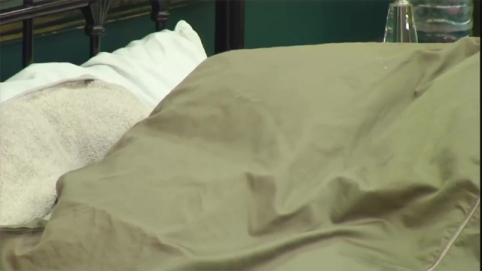
[Previous Great Moments: “I’m Not a Real Witch” — Jimmy Stewart’s Yeti Finger — James Cameron Digs Up Christ — Mr. T Thanks His Mother — Ricky Gervais Has a Fight — Byker Grove Nukes the Fourth Wall]
David Gest first attracted the attention of British audiences through his status as former Mr. Liza Minnelli, as seen in their all-time great wedding photo, where the happy couple stood alongside Liz Taylor, best man Michael Jackson, and Martine McCutcheon. As a nation, we all judged the book by its cover when Gest was announced as a contestant on 2006’s I’m a Celebrity, Get Me Out Of Here, as his look at the time was… shall we say, rather ‘Hollywood alien’. Look, I’m not throwing stones; if I had the cash, I’d be straight off to get my gnashers done, before figuring I might as well do something about my great big hooter while I’m at it.

As a complete unknown, joining a cast of big names such as Dean Gaffney and Toby Anstis, the images of Gest’s clay-like, simpering gazes at Liza — from whom he’d separate a year after the wedding — informed everyone’s assumptions that he’d be a prissy nightmare. Every year had a jungle diva, screeching in fright because they touched a tree, and boring fellow camp-mates with impotent, hourly threats to walk off the show. But Gest turned out to be a self-effacing, playful delight, who spent his time confusing dim-bulb D-listers with deadpan tall tales about his cleaner Vaginika Semen, and how he and Michael Jackson spent hours following spiders to see where they went. The Baron Munchausen via Carry On films raconteuring enamoured him to viewers, elevating Gest to one of those Americans who effectively become culturally adopted as British in the wake of a good showing, like Ashley Roberts would six years later. As a now-established face on our screens, it was inevitable David Gest would eventually sign up as a housemate on Celebrity Big Brother.
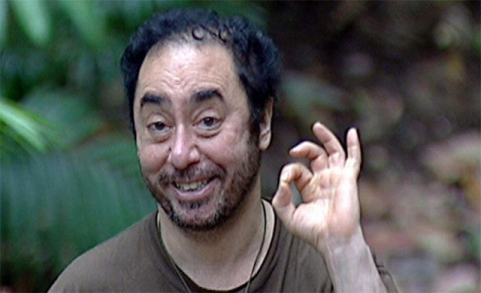
Channel 5 were asking for a bout of shrieking drama that year, with a perfect storm of the kind of tabloid types Gest was assumed to have been a decade earlier. Gemma Collins had herself been I’m a Celebrity‘s jungle diva, walking out of the show two years earlier after only 72 hours in camp, and more recently could be seen on the Crystal Maze, stopping mid-game and demanding to speak to the producer. Still, it’s good that TV continues to hand opportunities to someone whose entire brand (and skillset) is behaving like someone who’d be caught on CCTV doing a massive slash on your driveway of a Friday night, while swanning around expecting subjugation like she’s the Queen of England.
Danniella Westbrook had been a fixture in the redtops since her nose fell out in 2000, from hoovering up so much beak, and fell into a cycle of public relapse and redemption, including a brief period as a born again evangelical Christian in LA. Similarly obsessed over by Fleet Street was Darren Day, branded a tabloid “love rat” early in his career, and unable to shake the tag, perhaps due to a crippling addiction to becoming engaged to actresses. Though I couldn’t dig it out, I vividly recall a big Sunday exclusive about a lifetime of coked-up sex having left him punching himself in the penis “just to get some feeling in it.” Also in the house was Christopher Maloney, a losing X-Factor contestant whose admitted self-esteem issues manifested in a string of public cosmetic surgeries, with each new eyelid lift definitely the final key to happiness and self-acceptance. Following the show, he and Westbrook would become besties, even flying to the same surgeon in Poland for dual procedures, like you and a mate would a trip to the pictures, posting a video of the pair sat in bed eating crisps, while done up in bandages like the invisible man.

Though it was a full cast of sixteen — including Angie Bowie — the final housemate relevant to our story is Tiffany Pollard, aka ‘New York’ from VH1’s Flavor of Love; a show best remembered for the time a women pooed on the floor of Flavor Flav’s mansion while he was giving a welcome speech. The 17th series of Big Brother begun airing on January the 5th, 2016. Remember 2016? The year whose mere mention formerly made everyone do a sharp intake of breath, but now we’ve been through 2020, just seems like a right fucking laugh? Together, all these elements combined to form, arguably, the single greatest moment in the history of television. Occurring over a wildly chaotic yet brief seven minutes of airtime, its sheer historical weight requires it be broken down at a microscopic level, second by second.
It begins on January the 10th, with the tragic death of David Bowie. News breaks the following day, to both the world at large, and to Bowie’s ex-wife — and mother of their film director son, Duncan Jones — Angie, who, cut off from the outside, is called into the diary room and privately informed by Big Brother. What follows is classic British farce, where a grieving woman, still catching her breath from devastating news, is inadvertently pulled into a 1970’s sitcom. Angie is wet-eyed and clearly reeling as she wanders into the kitchen, and asked by Tiffany if she’s okay. Led into another room so they can talk, a distraught Angie begs “you gotta do me a favour, you can’t say a word.” As Tiffany assures her she won’t, it’s then that Angie says it. Two little words in a hushed whisper — “David’s dead.”
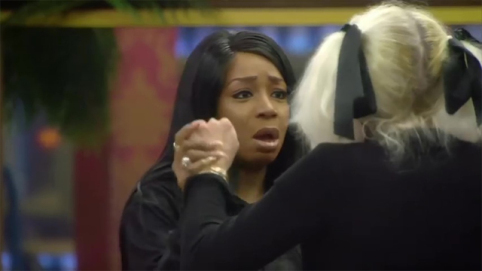
The sounds that Tiffany makes in response are akin to someone seeing a ghost over their shoulder in the bathroom mirror; a series of instinctual belly-deep howls and a panicked “NO HE’S NOT!” As though drowning, she flails an outstretched arm towards Angie; herself a woman in the first flush of grief, and now forced to restrain ‘New York’ in a half-hug, half-choke hold, as she goes off like a burglar alarm. “You can’t,” begs Angie, “you can’t, you can’t do that.” What is not known to Angie at the time, is that Tiffany has interpreted ‘David’ to mean David Gest, a housemate she has spoken to less than an hour ago.
Tiffany’s every outward breath is a loud cry of confusion and despair, and the sound arouses the garden crew, a posse of Day, Maloney, and Westbrook, sat on benches on an astroturf lawn in smoker’s corner, overflowing ashtray at their feet, arms folded to protect from the chill winter air. It’s the gossipy table at school lunch, reeking of Polo Mints to cover up the Silk Cut, and Darren wonders aloud “what the fuck is that?” though they do not get up to investigate.
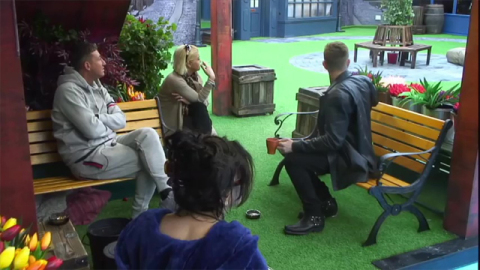
Back in the house, there’s a long back and forth of Tiffany freaking out while Angie tries to sooth her before she draws too much attention, all with the vibe of a movie set during the Holocaust; trying to quiet a crying baby while the floorboards above creak with Nazi footsteps. Clasping her disorientated housemate by the hand as she circles the room, Angie leads the pair in an unconscious Tudor dance, admonishing in a stage whisper — “Stop it, they’re all gonna know!” But Tiffany squirms out of a matronly hug, now struck by the stage of grief where you start laughing hysterically. “We gotta get everyone together!” she says, staggering off as Angie tries to shush her, and we cut to a close-up of Chris Maloney idly clacking his teeth. The conversation, which plays out over a few minutes of television, was edited down from 45 minutes, during which the producers, presumably like Angie, couldn’t believe how much of a hardcore Bowie fan Tiffany Pollard had turned out to be.
With a shambling run over to smoker’s corner, a sobbing, hysterical Tiffany is ensconced by Day and Maloney. “What’s the matta, babe?” asks the former. She babbles about Angie telling her a secret; a secret she cannot keep in — “I hope she’s just jokin’, but she says she’s not…” Big Chris Maloney is beside himself with curiosity, as he’s informed in a wobbly voice; “they told me David is dead!” Maloney’s eyes pop out of his face like two boiled eggs — “David? David?!” and the virus of Tiff’s hysteria instantly infects everyone within reach. Man of action Darren Day is off the bench like a shot, pelting towards the house in his cowboy boots, with the others following behind. In an empty room, Angie pleads, perhaps to Big Brother, perhaps to God himself, “you gotta help me… I fucked up.”
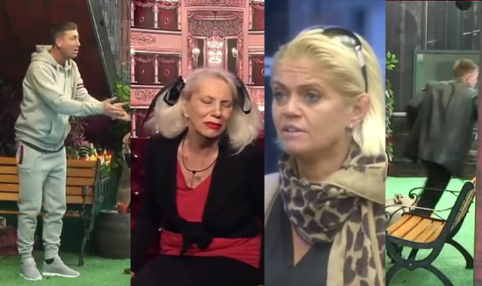
The other housemates burst into the bedroom, with Tiffany wailing “OH, GOD!” — ironically in the exact manner of a graveside widow — and an angry Westbrook demanding to know “where’s David?” The answer to that is ‘taking a nap’, but in truly incredible comic providence, specifically, a nap where he’s flat on his back, arms folded on his chest, with the duvet pulled right over, leaving a very still, very corpse-like shape on top of the bed. For a small moment, perhaps the greatest moment in all of recorded human civilisation, Gemma Collins watches open-mouthed from her bed, as Darren Day, Danniella Westbrook, Christopher Maloney, and New York from the show someone shat on the floor, genuinely believe that David Gest — who barely an hour ago was walking around chatting — has very suddenly died of an undiagnosed cancer, and that they’re about to pull back the duvet and reveal his corpse, which had been casually left there by producers as the show trundled on.
There seems to be a mass exhalation as Day whips the covers off to reveal a confused but alive David Gest, before the mood immediately shifts, not to relief, but anger. “SHE TOLD ME THAT DAVID DIED!” yells Tiffany, now furious at what she assumes is a horrible prank on Angie’s part, and sprinting off to confront her. Maloney follows behind, begging her “chill, chill, chill!” and a bewildered Angie watches through the window, as Stephanie Davis from Hollyoaks needlessly puts a hand up to hold her back, like a pissed-up brawl outside a kebab shop — “what did I do?” The penny doesn’t drop until Westbrook strides in to accuse her, in her Don Henderson voice, of telling Tiffany “that David was dead from cancer.”
Angie: “Yes, he is!”
Westbrook: “He’s in there, asleep!”
Angie: “David. My ex-husband!”

As Angie cries in the diary room, Tiffany; used to the American reality television on which she made her name; interprets the whole thing as Angie’s prank; as psychological gamesmanship; and is absolutely raging — “why the fuck would she get in my head like that?!” Inexplicably, even as the simple confusion is ironed out, the Smoke Crew now start arguing about Bowie. A furious Westbrook spits “David Bowie ain’t dead neither!” and that Angie, “she needs to be taken out of here, man… that’s fucking sick… speaking ill of other people like that is sick, and I can’t speak to her no more.”
At this point, the story very clearly switches to the idea that Angie did this deliberately, just for the fuck of it, and that nobody is dead. Tiffany starts misremembering, convincing herself Angie specifically said “Gest” and that he “died in the diary room,” presumably before C5 dumped his body in the bedroom like fucking Threads. Housemate Jonathan Cheban, mate of Kim Kardashian and “founder of thedishh.com” (thanks Wikipedia) paces the plastic lawn, aghast at Angie’s actions; “I’m not well with crazy people, I don’t have that in my life.” Westbrook takes the playground gossip into the bathroom, informing a wet and naked John Partridge through a crack in the shower door that “she told Tiff it was David Gest that’s died of cancer in the diary room or something.” “David Gest has died?” asks Partridge, whose soggy cock and bollocks are shielded only from the camera by the fumin’ figure of Danniella Westbrook.
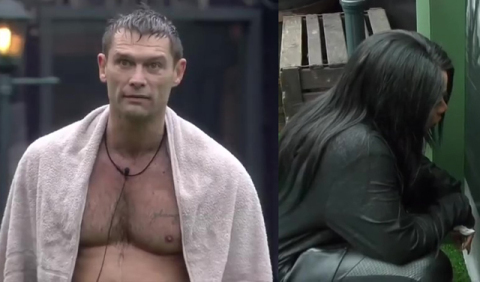
With everyone now baying for Angie’s blood, Partridge emerges into the garden in a towel to play peacemaker, albeit in a needlessly mysterious ‘I know something you don’t know’ way — “Angie has had some news… she’s misunderstood the name, that’s all i’m gonna say,” and hushing a still furious Tiffany with a pointed “it’s the wrong David, honey.” We end with Angie Bowie crying in the diary room, and Tiffany alone at the end of the garden, silently squatting on the astroturf, almost nose to nose with her own reflection, and staring blankly ahead like a dog that’s really contemplating itself for the first time in the family glass cabinet. In 2020, people kept saying how no generation had ever lived through as much history as we did that year, but keep in mind, this incident happened in the same week as Come Dine With Me‘s “what a sad little life, Jane.”
One thing that’s been lost in analysis of all this over the years is how it must’ve appeared from Angie’s side, having never crossed her mind that Bowie had been confused with Gest. Tiffany first wildly over-reacted as though she’d lost a member of her own family, before switching to disbelief; the belief that Angie must’ve been set a secret task by Big Brother to make housemates falsely believe her ex-husband had died; and finally that she’d done it out of spite. And all while trapped in a TV studio surrounded by cameras, with nowhere to hide, reeling from bad news she was desperate to keep quiet. Weirdly, Angie telling Tiffany in the first place was also symptomatic of the harsh competition of Reality TV, as Angie didn’t want her housemate to think her eyes were running because she had a cold, and was therefore weak.
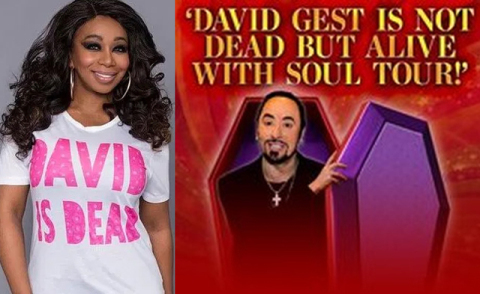
Following the fiasco, two of its main players really leaned into it, with Gest promoting a touring music show entitled David Gest Is Not Dead but Alive With Soul, the poster of which showed him emerging from a coffin like Dracula, with the date of his premature BB death emblazoned on the lid. Tiffany Pollard, who to this day gets “David’s dead!” shouted at her in the street, begun selling a range of t-shirts, bearing the words DAVID IS DEAD. Sadly, just a week after the shirts went on sale, and three months after Big Brother, David Gest unexpectedly died for real. Along with a series of ludicrous anecdotes, he leaves behind a legacy as centrepiece in one of the funniest things that ever happened, and all while taking a nap.
…
This piece first appeared on my Patreon, where subscribers could read it a month before it landed here. If you’d like to support me for as little as $1 a month, then click here to help provide the world with regular deep dives about weird-bad pop culture, early access to my podcast, and all kinds of other stuff.
There’s a ton of content, including exclusives that’ll never appear here on the free blog, such as 1970’s British variety-set horror novella, Jangle, and my latest novel, Men of the Loch. Please give my existing books a look too, or if you’re so inclined, sling me a Ko-fi or some PayPal cash.
March 7, 2021
Treasure Hunt
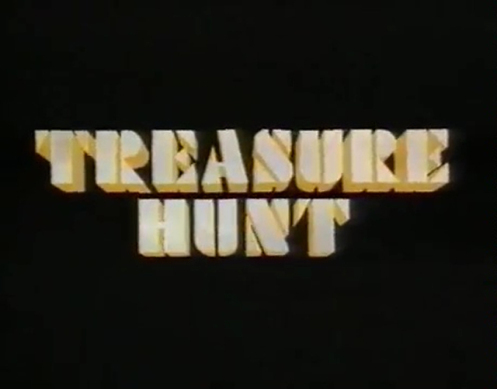
[more game show posts: Trump Card — Cyberzone — Scavengers — Naked Jungle — Runaround — Endurance UK]
In my gigantic list of horrible stuff to cover on here, I’d always planned on hitting 3-2-1, but I snoozed and losed, and Limmy beat me to it. So instead, let’s get into the era’s other weird as shit riddle-me-ree game show. Like Crystal Maze and Fort Boyard, Treasure Hunt is an adaptation of a French property, but the resulting series is so achingly British, it feels like something specially put together to rouse the Queen out of her room during a bout of depression. This isn’t a game show, it’s a roving Olympic opening ceremony, showcasing Middle England’s eccentricities, with Anneka Rice’s perpetually-out-of-breath, jolly-hockey-sticks dervish careening through villages and towns that haven’t had a Labour MP for 200 years, and giving them an anecdote to dine out on forever; the day a celebrity landed in a field and ran through the WI before vanishing.
I’ve never had a posh girlfriend, but watching this has the feel of being romantically involved with someone far above your grubby social standing, on the first weekend away at the future in-laws’ manor, where they pull out the family game they always play with newcomers; a game which is confusing, frightening, and ends with you running across the lawn being shot at by hunting rifles. As it’s the eighties, Treasure Hunt is a show built around exciting futuristic technology; namely, the ability to talk to someone as they whiz around the country in a helicopter. Inside the chopper is Anneka Rice, sent to various locations by studio-based contestants, as they solve a series of cryptic clues that will eventually lead to treasure.
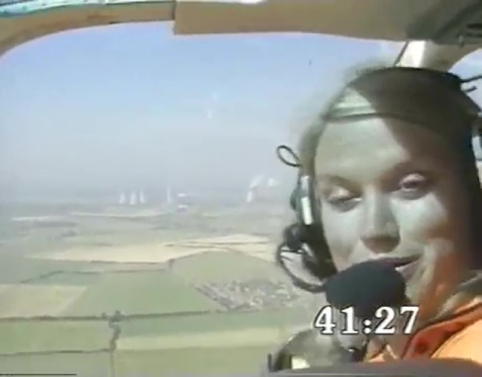
I’m watching an episode from January 1986, with an exciting title sequence of Anneka — called “Annie” with familiarity by the contestants — dangling from helicopters and leaping into the sea. From the opening second, it’s incredibly middle-class, and host Kenneth Kendall has the sort of clipped newsreader’s accent which makes me feel like I live in a bin. He’s joined by weathergirl Wincey Willis, with a Buck Rogers headset over Ricky Morton’s haircut, like she’s popped over on a break from Call of Duty. Incidentally, doesn’t Wincey sound like the nickname of WW1 soldier who flinches from bangs because of shell shock? — “Settle down, Wincey, lad, it’s just one of Tommo’s guffs!”
This week’s players, Val and Eira, are firmly the kind of people you’d never see on TV now, back when contestants were nervous, awkward, and clearly not at home in the studio, without years of selfies and Facetiming to get comfortable in front of the camera. She’s retired, and he’s a former veterinary surgeon and financial consultant. Both would definitely call the police if they saw me walking past their house. The studio’s set up like a spy’s lounge, in a single room lined with shelves of reference books, a fake fireplace, and everyone stood at a giant map-table. Anneka’s movements are marked by a toy helicopter, which is the most 80’s vehicle of all — Airwolf; Predator; Noel Edmonds and Mike Smith.
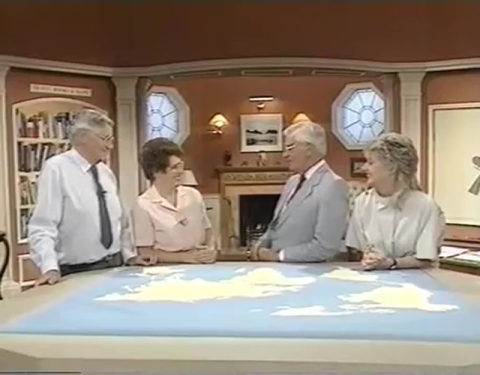
Anneka’s official title is the very Star Warsy ‘Skyrunner’, and just to emphasise the toffness, she begins beside a narrow boat, quoting Ratty from Wind in the Willows (or as she calls it “The Winds of the Willow”). The camera flips round to reveal Graham the cameraman and soundman Keith, who were semi-ironic celebrities in their own right, both lumbered down with gear. The restrictions of 80’s tech are apparent at every turn, and for the next hour of frantic running, Anneka’s in an enormous pair of headphones/mic, with a sound-pack the literal size of an old car stereo hanging round her neck. The trio are wrapped in a trail of thick black wires and curly cables like goth Christmas trees, and though the studio can’t see Anneka, they can hear and speak to her. There’s £1,000 at stake, 45 minutes on the clock, and it’s time for the first clue. Shall we play along at home? Ready?
“Before you come to power, halt for a run on historic lines. A coach for the track event has chocolate and cream waiting.”
Oh. Val commands Anneka into the air, using shelves of reference books to figure out where to send her. A clock counts down in the bottom right, while clues loiter onscreen in a font usually seen on VHS tapes reading ‘Steve and Tanya’s Big Day, 1986!‘ The chopper circles over river cruisers like a gunship readying to cut them to shreds with high-velocity armour-piercing rounds, as elderly contestants’ voices overlap with that of Anneka, shouting at the top of her lungs over the rotors, hair billowing into her face, and clutching a folded map. Intercut with lurching zooms on the landscape below, it’s a disorientating experience, with the two groups holding unrelated, simultaneous discussions, the entire time. The studio read aloud from text books, while a yelling Anneka witters on about scuba diving, like a pair of blaring televisions tuned to different channels.
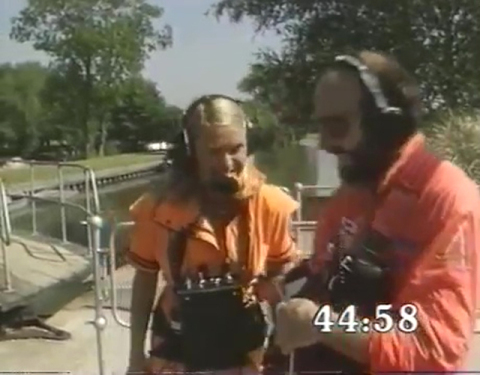
Kendall reads aloud the names of nearby hamlets, each sounding like the setting for a mid-afternoon ITV drama where a rich old widow’s been killed by a runaway lawnmower — “Long Whittenham, Appleford, Sutton Courtney…” Everyone chatters away as Anneka screams that there are “FIVE BIG CHIMNEYS” on the horizon; “AND A VERY LONG FUNNEL,” she adds, raising an eyebrow salaciously, as if to infer that men’s stiff willies can sometimes be long too. The chocolate and cream is eventually identified as the markings of a distant train, landing so Anneka can sprint towards it in a fevered foot-chase, with Graham and Keith following behind.
Anneka’s breathless running is show’s trademark, along with the passing shrieks of “HELLO!” thrown at bystanders like hand grenades. Treasure Hunt‘s overpowering middle-classness is evident as she hops on a steam train, where passengers scoff cream tea elevenses. There are moments the series feels like a video game; particularly in Anneka’s interactions with the people she meets, never sure whether they’re ‘in on it’ and awaiting her arrival, primed to aid in her quest, or merely regular folks who are silent, not because they’re banned from giving too much help, but because they only popped out for a pint of milk, and now Anneka Rice off the telly is rifling through their pockets, looking for an envelope. Luckily, the waiter whose trousers she investigates isn’t an NPC, but part of the show, and we find our next clue.
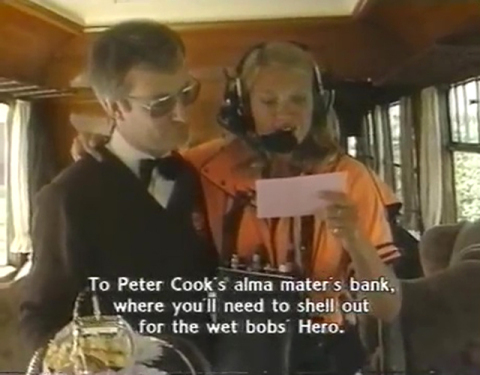
“To Peter Cook’s alma mater’s bank, where you’ll need to shell out for the wet bobs’ Hero.”
Anneka scrambles back over the tracks, past railway workers in period costumes, while singing Happy Birthday to the Great Western Railway, in a ‘sending get well cards to Boris’ way — then it’s back to the air. Let’s examine this clue. Wet Bob? Is that not just the name of a local weirdo your parents warned you about as a kid? “Don’t go down the arcade, that’s where Wet Bob hangs out…” – half a dozen stories for how he got his name; his wife drowned so now he lives in the sea, or “you know that’s not tea he keeps in that flask?” Turns out, ‘wet bobs’ are Oxford rowers, as opposed to the hockey-playing ‘dry bobs’, which sends her up the river to a boathouse.
Barring ad-breaks, every segment is an exhausting single take, now sprinting from train to chopper, out onto a pontoon, and leaping into a boat, to row up to another boat that’s waiting upriver. Poor Graham, shouldering a camera the size of a golden retriever, has to keep pace by running alongside, before scrambling into a third boat to follow. A posh rower called Tim reads out the next clue, which is full of words he can’t pronounce.
“Look in on the bibliographists opposite the Encaenia location and ask for a note on Dodgson’s Liddell account.”
Oh, just… just fuck off. Though I’m left feeling like a gutter-scum thicky, Eira proves social class doesn’t necessarily represent smarts by having to look up the word bibliographist in the dictionary. Anneka whirs off towards Oxford, landing in the grounds of St. Hilda’s college, where four butchers are standing outside, exclaiming “You smell of blackjacks!” at them. But their target is miles away, so she accosts some students and borrows their bikes — which just happen to be there — everyone loading their equipment into the baskets and taking off. The camerawork, in a pre-GoPro world, is like a magic trick, continually filming while cycling along a busy road and panning to the sights, even looking down to show both his hands on the handlebars.
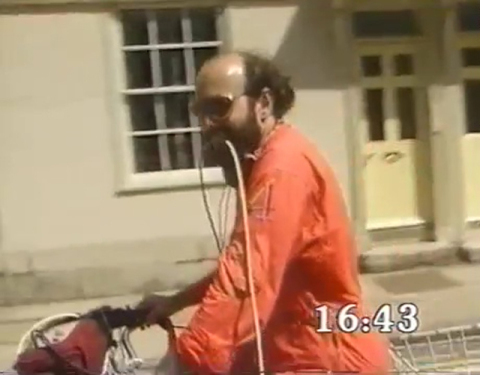
Tragically, it’s here I become a Facebook boomer, reminiscing about penny sweets and blacking up, as I get swept into the nostalgia of 1980’s Britain’s sun-drenched pavements, back when there was still hope. Lockdown III is getting to me. It’s seven full minutes of top-speed cycling, taking them across busy roundabouts and veering dangerously through traffic, with Anneka yelling at the top of her lungs the whole time, or breaking into song, as Eira tells her “good girl.” A pan to the sound man reveals he is sweating profusely, gripping a thick white cable between his teeth like a horse. Journey’s end is an enormous bookshop, with dozens of customers milling about, and amid all the outdated technology, the most jarring sight is the now-lost tableau of bustling British retail. Anneka finds the clue in a window display about Lewis Carroll. “Good girl,” says Kendall.
“Fair Rosamund’s tomb and a Schubert quintet bring you to a bunch of cuporus fagus”
“Bunch of cuporus fagus” sounds like a Tweet that’d get olden times Kevin Hart kicked off Ye Oscars. They’ve bombed back to the chopper by car in the ad break, with the girls’ bikes presumably never to be seen again, while the studio thumb through Latin dictionaries. Wincey warns there’s only five minutes left, as Anneka pelts past ancient stone walls and Pimm’s-sipping picnickers, before fishing the final clue down from a beech tree, apologising to the branch as she does, as though it might reply “that’s quite alright!” in an Enid Blyton voice.
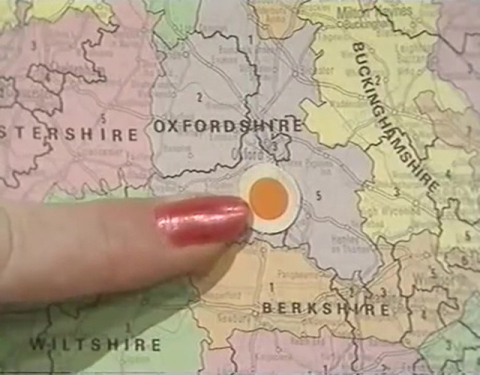
“Connect Southey’s old Kasper and a proposal to Miss Hozier, then use a communications room to come face to face with Mrs Freeman’s father-in-law”
Miss Hozier is Churchill’s wife, but the clock runs out on the way to Blenheim Palace, so they fail to win the ‘treasure’ of a toy soldier, or the £1000. They do get a rather generous half that for losing, which Eira explains they’ll give to charity; some to guide dogs for the blind and more sketchily, “some will possibly go to the St. Peter’s Church, which my wife attends.”
Unusually, contestants are listed in the credits under their full names, which is a GDPR nightmare these days. Imagine thirsty Twitter with this kind of information when they’re leching over girls off The Chase. The second episode comes from the following year, 1987, and the players are markedly less posh, rocking some incredible looks, with Jim, a computer repairman who resembles Will from Stranger Things as a medieval peasant, and his boss; big, tall hoss of redhead called Mike. Wincey’s dressed in the flowing blue robes of a 1960’s sex cultist, while Anneka’s halfway up a mountain on the Isle of Skye. The setting inspires a ton of classic-period Scottish references in her; adding Mc to the crew’s names, asking where their kilts are, referring to “The Scotch,” and filling the airtime with shouted variations on “och eye the noo!” — peaking with “och aye the clue!” Over the course of this Patreon, I’ve acquired a real admiration for the Scots, and their phenomenal restraint in not going to war with us in the eighties.
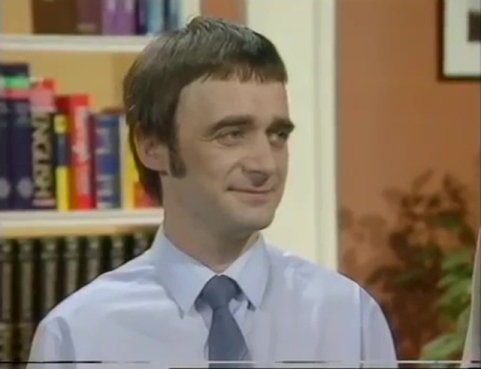
“North of the Gavin Maxwell shore, pitch at a palindrome. Check the MacLaine colours and it’s in the bag.”
C’mon, that first clue’s actually doable! Bag; so it’s in a sporran, hanging on some MacLaine tartan, and she’ll have to root around in there while pulling a face that says “oo-er, I’m right by this fella’s wee chap!” Who’s Gavin Maxwell, though? Someone who manages a call centre and has the words ‘season ticket holder’ in his social meed bios, no doubt. Dropped off at the highland games, Anneka does indeed grope around in an old piper’s sporran, before saying “Och aye!” and kissing him on the lips. Sadly, cum doesn’t shoot out of the end of his bagpipes.
“MacKenzie’s coat of mail was constable where three lochs meet. A fourth lock — the young Chevalier’s — is your key”
The lads get really excited about a lock of Bonnie Prince Charlie’s hair, as Anneka’s sent to a castle. “YOU SOUND DEMENTED!” she screeches. The hair’s located in the banqueting hall inside a case, which she mishears as “cake,” wasting lots of time. Eventually, after no help at all from Treasure Hunt‘s waiting plants, all stood silently with their arms folded, like when Chris Whitty was shouted at by that teenager, the next clue is finally located.
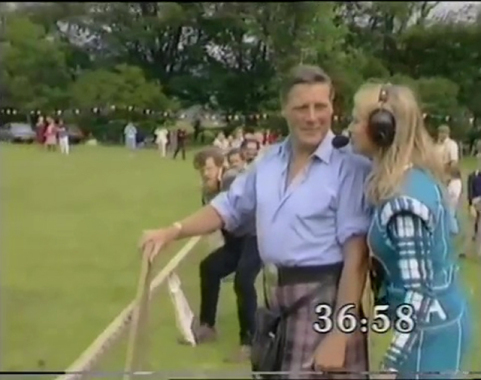
“On the way to the sororial quintet, take the high road and alight on a mixed-up Bob Cage for a face-saving exercise”
“Mixed up” clearly implies Bob Cage is an anagram. So… babe cog? C bae gob? See bae’s gob?! Anneka, you need to find a mural of Anna Kendrick, the clue will be hidden in the (lovely) mouth. Turns out, it’s not that at all, but a mountain called Boc Beag, where she spots a “pin prick of a man” atop the mountain, silhouetted through the shaky-cam like a Yeti; “what’s he doing?” asks Kendall. “He’s taking off his trousers,” replies Annie. The unfortunate man is not part of the show, and presumably got the shock of his life when about to take a dump 1500ft above sea level and turned to see a helicopter with a film crew hanging out of the door.
The path to the clue is a cracking example of 80’s television’s approach to health and safety; the decade where Noel pissed himself laughing as untrained volunteers drove over ramps at 100mph. Dumped onto a precipice, a reticent Anneka’s left to slide down slippery slopes to a mountain rescue team, before being strapped into a stretcher and slowly scaled down the cliff-face, by men with no safety ropes, blindly backing towards a fatal drop. It’s all shot from above like arms-length news footage of the SAS storming a terrorist embassy, taking the clue from a man literally hanging half-way down a sheer mountain.
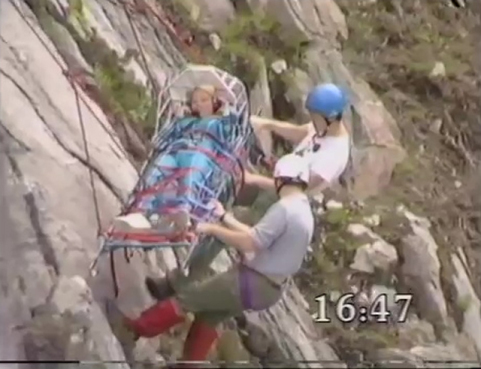
“Towards the northern welkin crossing, stand at bay by Inverewe’s counterpart, and embark on a venture to find a cocktail element”
“Och aye!” says Anneka. She accosts a man in a row-boat, pulling us into that videogame feel, asking for a lift, and metaphorically mashing every button on the controller, yet to hit upon the key phrase which triggers his help, and leaving him unable to respond with naught but confusing and obstinate silence. Is he part of the game, or just a prick? Keith’s corralled into a Loch-side highland fling, before the boatman finally rows them out to his trawler. It takes him ages to row all four of them there by himself, and Anneka finally clambers aboard the trawler while he awkwardly tries to help whilst neither touching nor getting his face too near her bum. The final clue’s in a prawn trap.
“Off the rails! A semblance of Scottish liqueur is left, but a little port looks right. A green gate leads to a palmy point.”
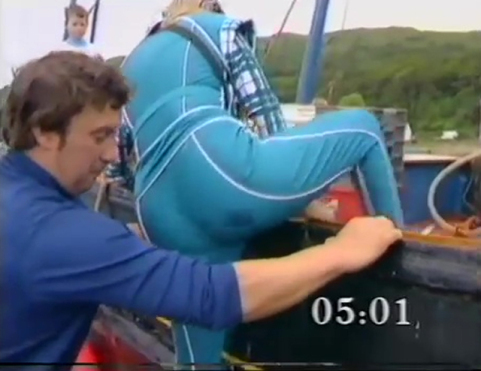
But there’s less than four minutes on the clock, a quarter of which is wasted trying to get the clue out of the basket, before a genuine moment of panic when climbing back down into the row boat, and snagging her ankle on the side of the hull, almost breaking it. It’s all too late, as a maudlin piano note signals defeat, and the end of another round of Waitrose Tomb Raider. From a channel that, thirty years later, would bring us Naked Attraction and Benefits Street, Treasure Hunt is a curio of a lost time; a lost Great Britain which never really existed, but happily whiled away its weekday hours in antique fairs or stately gardens, secure in the knowledge that Diana would one day be its queen. However, reboots of all existing properties are inevitable, and every passing minute inches us closer to Kenneth Kendall’s place being taken by Joe Swash, watching the clock run down as Gemma Collins refuses to get in the helicopter because it’s the wrong colour.
…
This piece first appeared on my Patreon, where subscribers could read it a month before it landed here. If you’d like to support me for as little as $1 a month, then click here to help provide the world with regular deep dives about weird-bad pop culture, early access to my podcast, and all kinds of other stuff.
There’s a ton of content, including exclusives that’ll never appear here on the free blog, such as 1970’s British variety-set horror novella, Jangle, and my latest novel, Men of the Loch. Please give my existing books a look too, or if you’re so inclined, sling me a Ko-fi or some PayPal cash.
February 27, 2021
VHS:WTF – Liz Dawn’s House Party
Vera Duckworth serenades the cream of British variety with comedy and song, from her own front room, as my latest video examines the utterly bewildering mid-90’s VHS release, Liz Dawn’s House Party.
…
This video first appeared on my Patreon, where subscribers could watch it a month before it landed here. If you’d like to support me for as little as $1 a month, then click here to help provide the world with regular deep dives about weird-bad pop culture, early access to my podcast, and all kinds of other stuff.
There’s a ton of content, including exclusives that’ll never appear here on the free blog, such as 1970’s British variety-set horror novella, Jangle, and my latest novel, Men of the Loch. Please give my existing books a look too, or if you’re so inclined, sling me a Ko-fi or some PayPal cash.
Liz Dawn’s House Party
Vera Duckworth serenades the cream of British variety with comedy and song, from her own front room, as my latest video examines the utterly bewildering mid-90’s VHS release, Liz Dawn’s House Party.
…
This video first appeared on my Patreon, where subscribers could watch it a month before it landed here. If you’d like to support me for as little as $1 a month, then click here to help provide the world with regular deep dives about weird-bad pop culture, early access to my podcast, and all kinds of other stuff.
There’s a ton of content, including exclusives that’ll never appear here on the free blog, such as 1970’s British variety-set horror novella, Jangle, and my latest novel, Men of the Loch. Please give my existing books a look too, or if you’re so inclined, sling me a Ko-fi or some PayPal cash.
February 17, 2021
The Accursed 90s – Endurance UK
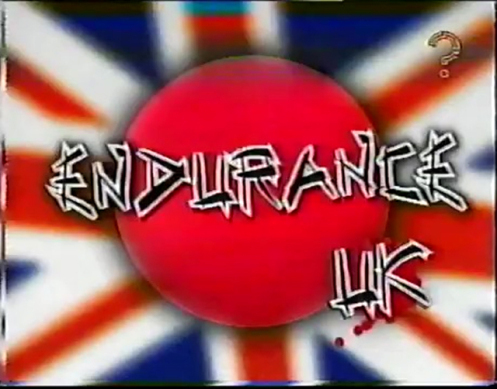
[More Accursed 90s: Televised Lad Contests — Don’t Forget Your Toothbrush — Talk Show Goths — James Whale on Television — Craig Charles’ Funky Bunker — The Word — The Girlie Show — An Accursed 90’s Christmas]
Before British television became uniformly embarrassing, home audiences had to ring second-hand cringe-laughs from the clip shows of Clive James and Chris Tarrant, shrieking at pre-watershed cereal ads from Europe which casually featured bare breasts, and game shows that tormented their contestants — often half-naked and crying — to physical and mental breaking point. This was the era when home-grown quizzes consisted of Lennie Bennett and Paul Daniels reading questions off cards and swapping light banter with people in lovely knitwear, pre-dating the performative rudeness of a Weakest Link or low-offer treachery of The Chase. Chief of these outrageous foreign shows was Japan’s Za Gaman, better known as Endurance; a gross-out hybrid of Jackass and The Running Man, whose Salò-esque antics boggled the innocent minds of a nation reared on Tom O’Connor’s Crosswits.
In 1997, Sky’s Challenge TV, a channel heavily centred on imported game shows, remade Za Gaman, under the title of Endurance UK. While other Japanese formats have since become popular in other countries — such as Sasuke, remade as Ninja Warrior — this would be the first to undergo a British remake. Although ‘British remake’ is perhaps an odd descriptor for a show whose tone and approach can be surmised by two words — spoken on the single surviving episode that hasn’t been put in the bin — “Lule Blitania!” They kept a Japanese theme; at least, the Japan of Batfink and Benny Hill sketches; all kanji fonts and a Japanese flag motif, in a mock-pagoda studio with demon masks on the walls and a pair of sliding paper doors for Paul Ross to enter through, along with “his crazy couple of Pot Noodle pals!” These pals are ‘Japanese’ sidekicks, Hoki and Koki.
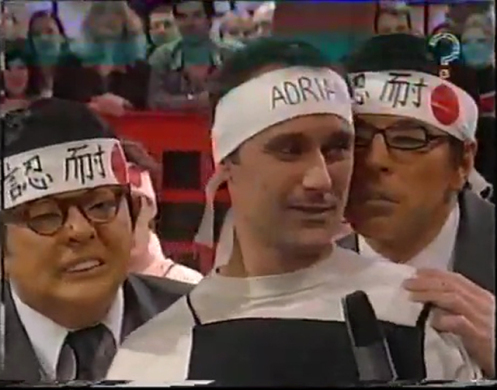
I generally like to let the material speak for itself, but Hoki and Koki are one of the most egregiously racist things from the last fifty years, and I say this as someone who sat through Curry & Chips. Rarely have characters so fully leapt into the bowing, “ah-so!” stereotype with both feet, and every word of the script exists solely to wring maximum laffs from switching Ls and Rs — “herro, Mistah Loss!” The concept designs appear to have been lifted from 1930’s anti-Japanese propaganda posters, hiding the white actors beneath yellow skin, enormous buck teeth, and prosthetic appliances that make their eyes all slitty. They’ve got karate headbands, glasses to squint through, and throughout the show are referred to by epithets like “yellow” and “inscrutable.”
The usual benchmark for bad yellowface is Micky Rooney’s Mr. Yunioshi in Breakfast at Tiffany’s; a character which sits in a film otherwise considered a Golden Age classic like a freshly-murdered corpse in the tub of your nice new bathroom. The only way to keep Tiffany’s from being condemned to the same vault where Song of the South and Rolf’s Cartoon Club live is to play it off as The Bad Old Days; we didn’t know any better then, but we do now. Endurance UK came 37 years later, and Challenge figured not only was it fine, but actually, Rooney’s character didn’t take it far enough — “yeah, plaster some canary-coloured paint on there too; have Paul Ross call them Pot Noodle pals…”
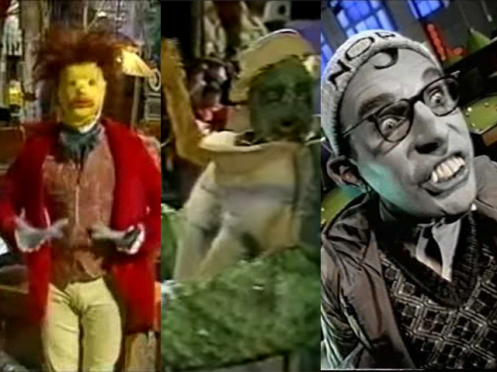
Though Hoki and Koki are credited as themselves, they’re portrayed by a pair of comedians from Saturday morning kids show, What’s Up Doc?, which shares its director with Endurance. Both men were used to working under prosthetics while portraying nightmare characters, with Peter Cocks playing, among others, the genuinely terrifying Naughty Tortie, while Stephen Taylor Woodrow’s buck-toothed nerd character, Simon Perry the Cheese Ranger, would later be renamed as Norm in a series of successful Twix adverts. Though he doesn’t appear in the episode, Chris Sievey aka Frank Sidebottom would also feature on Endurance, wearing a German SS helmet, Hitler tash and leather shorts, in the role of Gimp-Man.
Endurance UK‘s racism runs deeper than its sidekicks; it’s the core structure of the show. Unashamedly, the vibe that Challenge are going for is a cheery nod towards the Japanese reputation for committing unspeakable acts of torture on POWs during World War 2. When contestants line up at the beginning, Paul Ross describes the formation as “Tenko style,” while Hoki and Koki threateningly parade up and down, brandishing bamboo canes and yanking players out for a chat with Ross like they’re about to be sewn to a live boar with a grenade up its arse for the amusement of the guards.
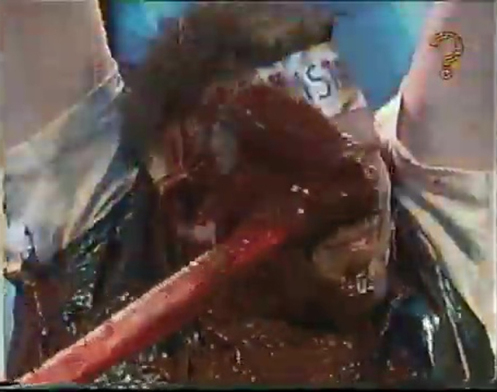
Contestants are clad in red PE shorts, with headbands and bibs bearing Japanese writing, like that tattoo you got on holiday in Ibiza ’99 which you think says WARRIOR but actually reads STUPID ENGLISH DOGFUCKER. Most hold bottles of booze which they raise in toast as the camera whizzes past, one of them crying “ah-so!” while another pushes his face into the lens, yelling “mad for it!” like the entire 90s has been manifested into a half-cut tulpa with Britpop sideburns. They’re playing for a place in the grand final, where a round-the-world trip for two is at stake, but the evening’s only actual prize is a trophy of a golden hand with two fingers up in the peace sign — you know, like Japanese people do in photos and that? Ross uses it to flick Vs at the camera while a loud fart noise is piped into the studio.
The short chats between contestant and host are a vivid portrait of a time; a time when everything and everyone was absolutely awful; each regaling with their best anecdote, as one would when finding oneself on telly. Nick showed his pubes on stage in front of 200 people, Mark likes football and drinking, while Steven “got stitched up on holiday, where I had to teach about 400 people to do the Agadoo dance!” Alastair teaches children with special needs, and asked if he could do anything for Hoki and Koki, replies “I’m afraid they’re beyond my repair.” Nicky describes herself in two words — “cheeky but probably a bit of a nightmare” — before Paul Ross asks, well, see for yourself.
The first round is Pee Wee Herman’s breakfast machine by way of Dr. Mengele, with everyone taking a “rie down for sreepy times” on their backs, legs in the air, so the “big prick” of a needle held between the thighs doesn’t drop and burst a balloon, which will empty a bucket of pig urine over their face. It goes on for fucking ages, with Hoki and Koki berating and poking them with sticks like the Russian roulette scene in Deer Hunter, and tossing handfuls of white powder in their eyes to put them off, like in the old wrestling tradition of sneaky Japanese heels blinding opponents with handfuls of salt. After endless close-ups of trembling legs, four buckets of pig-piss half the field, and plinky-plonky Oriental music plays off the vanquished as Paul Ross bids them “sayonara!”
Proceedings are broken up by clips of the original Japanese show, where “rubbery rads” (lovely lads) are hogtied and covered in birdseed while pecked by chickens, holding in wee after being forced to drink gallons of water, and hanging upside down dressed as bats while covered in cockroaches. But all this, and the studio games; it’s just twee nowadays. We’ve all seen Steve-O stapling his ballbag, and we’re two decades removed from Dave England re-eating a previously digested omelette. You gasping nineties try-hards, you are babies, squealing in horror as loose chickens peck seeds from a man’s legs, while we’re casually putting Netflix on as we eat our tea, to watch a pig munching an apple right out of Preston Lacy’s anus while Bam Margera vomits.
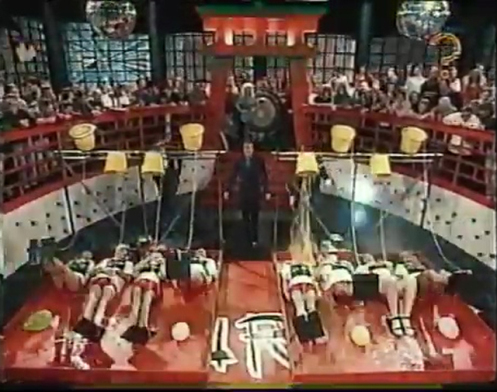
But there is a genuine air of danger in the studio, of unpredictability, with everyone on edge, and a sense that even the audience aren’t safe, pulled into participation sections, like a bit with a puppet ‘Japanese fighting cock’ — “you rike-a cock?” — where Hoki and Koki hurl eggs into the crowd. Of course, the puppet violently mauls Ross like Emu, and later they’ll take it into the stands with a fiver in its beak for anyone brave enough to try and grab it. The female volunteer’s asked “have you ever had an encounter with a one-eyed cock before?” before the bird attacks. She screams like she’s being murdered, pulled around by the hair and dragged to the floor, and laughing with a shocked “oh my god!” as she’s finally let up, looking like she’s just fallen out of a passing tornado.
Like the Carry On films, rounds are initiated with the banging of a gong, by an outrageously dated sexy nurse in suspenders, whom Paul Ross saucily instructs to “bang for us.” I don’t know if you’re aware, but ‘bang’ is occasionally used as slang for intercourse. What is he like?! Other introductions include “some people say an apple a day keeps the doctor away, personally, I prefer a pear (of great big tits!!!)” and a simple “in lovely, wobbly action; bang away, babe!”
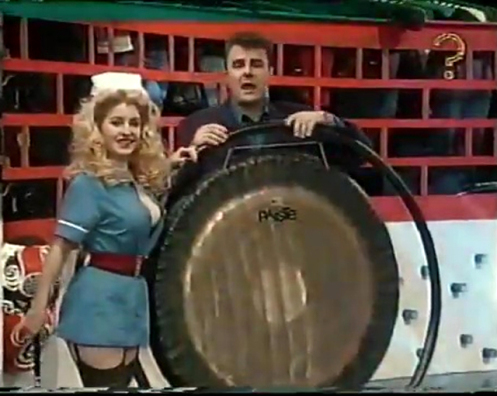
Round two has contestants wrapped in bin-liners to hang from a bar with an egg in their mouth. It’s massively overbooked, with hissing cockroaches down their tops, rats running over their hands, fake shit smeared on their faces with a mop, a boxing glove on a broom punching them, and wax strips (clearly just sellotape) being ripped from their thighs. Everything takes longer to explain than do, which is still ages, and it all feels like the ‘initiations’ a school bully makes kids do under the presence of joining a fake gang, where 20 years later, he lives off cup-a-soups in a hovel because all his wages go on a crippling addiction to bespoke S&M pornography. Though it’s all basic I’m a Celebrity stuff, I did grip the edge of the desk when they pushed the whole egg right inside their mouths, having flashbacks to that bloke whose act was swallowing a billiard ball.
At the start of the third round, stood at his ‘sushi bar’, Hoki greets Ross with a “herro, Paul” instead of the subservient “Mistah Loss” — an infraction which usually earns a slap round the face as punishment. But he doesn’t do it here, perhaps as a result of the incident in this clip where Hoki bundles Ross to the floor in retaliation and legitimately kicks the shit out of him. Ross can be heard grunting in pain and calling for a Stanley(?), before they get back into character and carry on; “harmony has been restored.” “I ruv you.”
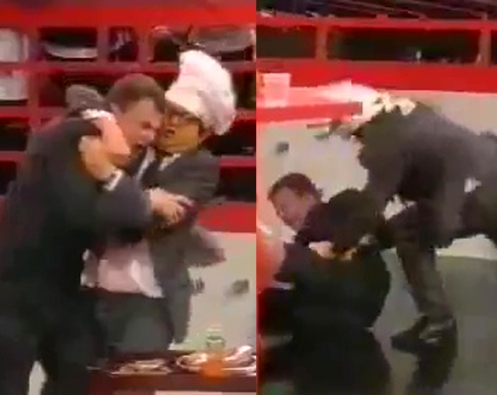
The third round is more stuff that would get crossed off Ant and Dec’s whiteboard for being too boring, with everyone getting pig brains, dead cockroaches, and smelly old eggs dropped into their mouths via a feeding tube. Beforehand, they give one of the eggs to a middle-aged bloke in the audience to sample, which he calmly nibbles like he’s eating a digestive. Contestants also have live chickens pecking seeds off their legs, and we go to an ad break with Hoki turning his back to camera and pretending to show the audience his dick, although judging from their reaction, it seems like he actually got it out. The final game has the last surviving pair attached to a winch by the ankles, pelted with lumpy gravy and maggots, with the loser whoever lets go first and gets yanked into a pile of manure.
A shit-covered winner is crowned, earning a cigar and the chance to do it all again in the final, as Hoki and Koki fulfil another stereotype — love of karaoke — and sing us out with Endurance UK‘s anthem, which is rife with kung fu sound effects and lots of Ls and Rs they can swap around.
“beat me, whip me, cover me in jam,
flog me, snog me, I don’t give a damn
tweak me twang me, make me eat lard,
but you know you’ll never break me cos i’m too flippin hard!”
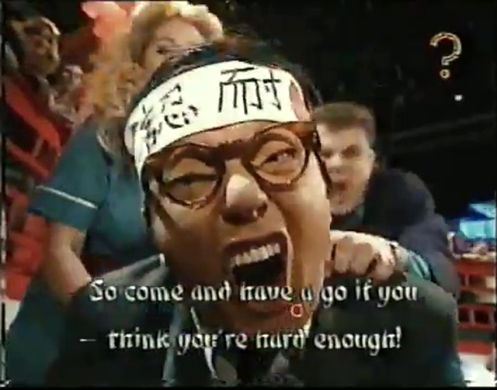
Endurance UK ran for, well, I’m not sure. Though it’s vividly remembered by its target demographic of ‘people who were in their 20s in the 1990s,’ almost everything about the show has been scrubbed from the internet, to the point I can’t even discern how many episodes occurred in its run from 1997-98. Challenge’s other big Japanese import was Takeshi’s Castle, dubbing footage from the original version with ‘funny’ English voiceover from Craig Charles, and his catchphrase “happy clappy Jappy chappies.” While Takeshi’s Castle went through a number of revivals between 2002 and 2013, jumping to Comedy Central in 2017, and is still running today, funnily enough, Endurance UK has stayed in the late 90s where it belongs. It’s for the best, considering the torture gimmick has since been adopted by television’s cosy mainstream, robbing it of that precious shock value. Also, you know, cos of all the terrible, terrible racism.
…
This piece first appeared on my Patreon, where subscribers could read it a month before it landed here. If you’d like to support me for as little as $1 a month, then click here to help provide the world with regular deep dives about weird-bad pop culture, early access to my podcast, and all kinds of other stuff.
There’s a ton of content, including exclusives that’ll never appear here on the free blog, such as 1970’s British variety-set horror novella, Jangle, and my latest novel, Men of the Loch. Please give my existing books a look too, or if you’re so inclined, sling me a Ko-fi or some PayPal cash.
February 7, 2021
The Larry Grayson Show
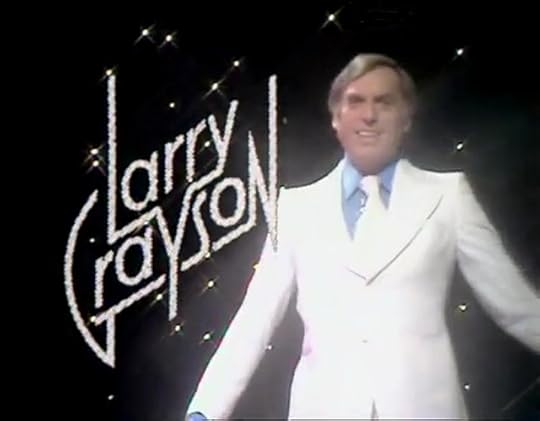
Larry Grayson is another performer who exists in my mind, and perhaps in modern pop culture, more defined by other people’s impressions of him than his actual self; an entire historic essence boiled down into the catchphrases “shut that door” and “what a gay day!” Mike Yarwood and co drained a great many hours of mileage from Larry, sucking in their cheeks and cocking their wrists, but outside of clips, the man himself is a bit of a blank spot in my knowledge base. It’s time to rectify that. Sounds a bit rude, doesn’t it? Like ‘rectum’? Please yourselves.
Grayson’s fame came during the period when you could be both super gay on TV, but also not actually gay at all. Comedy of the seventies was loaded with homosexual characters, albeit mincing comic grotesques (see Carry On Girls‘ Cecil Gaybody), along with those made palatable to, shall we say, less-enlightened audiences, by being couched in labels like ‘confirmed bachelor’ and ‘light in the loafers’ or hidden behind sexless mummy’s boy archetypes. Sexuality escaped via relentless innuendo and campery; a hangover from when just being yourself as a gay man could get you locked up, and your life — let alone reputation and career — utterly destroyed as a result, famously exemplified by Round the Horne‘s Julian and Sandy, and their use of Polari.
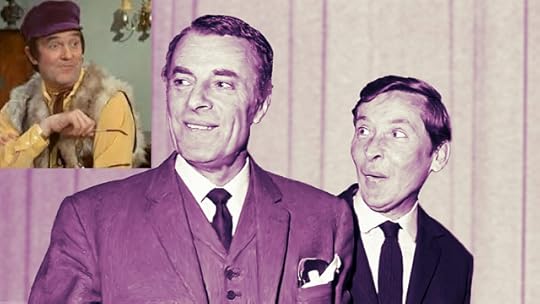
Though people loved to laugh at/with gay characters, if any had kissed another man onscreen, or even confirmed that’s what they did in real life, punters would have burned the studio down. Although even today, a certain brand of idiot are still having conniptions at the first same-sex dance coupling on Strictly. When The Larry Grayson Show first aired in 1975, homosexuality had only been decriminalised in the UK for eight years. To put that in perspective, it’s currently eight years since Thatcher died and Jennifer Lawrence tripped up the stairs at the Oscars. I’ll be starting my watch with episodes from that first series.
Larry came to success later in life, aged 52 at the launch of his solo series. This gives me hope, now in my 40s and still yet to host a revival of Fortean TV or be identified as ‘mystery hunk’ in a tabloid photo of Anna Kendrick coming out of Superdrug. Its opening is the purest, most powerful of 70’s variety glitz, with Larry’s name appearing in a literal golden shower of sparkles, etched onto a starry sky, before emerging in a suit so dazzlingly white against the fuzzy period cameras, the resulting flare surrounds him in an angelic glow. To a big band soundtrack of trumpets; chandeliers hanging from the ceiling; he saunters down a blue-lit marble staircase, lined by men doffing their top hats as he passes, with such a tumbling cascade of dry ice, it looks like the building’s on fire. As the curtain drops, he takes his place centre of stage, alone, with the single chair that would become one of his many trademarks.
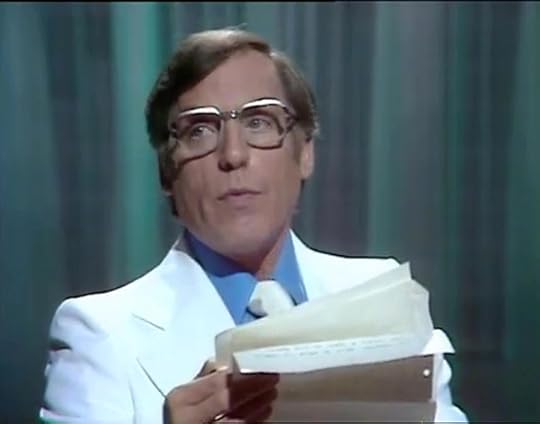
The opening monologue really establishes the time period, its attitudes, and the comedic style which arose, with anything even vaguely suggestive eliciting peels of shrieking laughter, setting the audience off with mere mention of making a tea cosy. This is 1970’s high campiness that could make a double-entendre out of anything, perhaps in part due to the general public’s lack of understanding of that mysterious species, The Gay, and what they even got up to. It’s this which renders a seemingly harmless statement like “which hole shall I put the side for the spout?” (potentially) absolutely disgusting. Coming out of Larry Grayson’s mouth, anything could be rude, getting laughs from whelks, winkles, rhubarb tarts, and the act of riding a bicycle. But he also nails that perfectly constructed innuendo; “I shall miss the doctor, he gave me something to cling onto. [looks straight down the lens, inferring it was his penis] I’ve been under him for years.”
Larry’s stock in trade is rambling whimsy, like a gay Dave Allen, regaling us with the doings of an unseen cast of acquaintances and neighbours, like Apricot Lil, Slack Alice, Everard, Brenda Allcock, Non-Stick Nell, Pop-it-in-Pete the postman and Rodney Ramshaw the retired navel stoker (who comes out when Everard’s boiler goes funny). The delivery is absolutely impeccable, a note-perfect mix of faux innocence and knowing looks, peppered by weird little asides. The neurotic character of Larry is constantly distracted by drafts and dust, by dirty microphones and the state of his hair; attention span wavering to minor medical issues like verrucas, with the recording of a television show taking second place to life’s niggling minutiae. Who else would stop a pianist mid-song to ask “did you post that letter for me?”
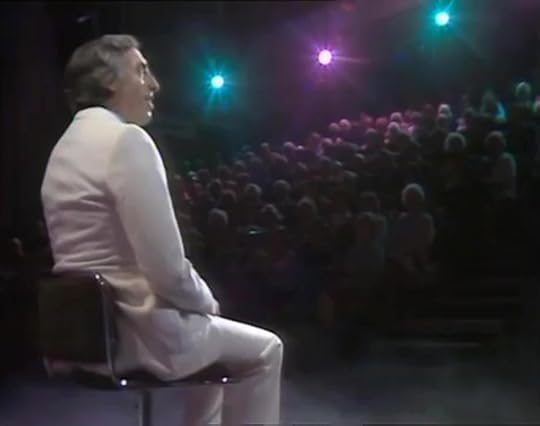
It’s also plump with that brilliant comedy of specificity — as put to great use by Victoria Wood, Alan Bennett, and The League of Gentlemen — all gypsy creams and sitting in front of the immersion heater, or being given “an umbrella with an unusual handle.” As you can probably tell, from the off, I’m fully onboard. I’ve become accustomed to almost all comedy from this period being a horror show, but Larry’s one of those wonderful surprises, and at points, I’m shaking with laughter, having to pause to gather myself. He’s such a joyful performer, it’s impossible not to get swept along.
One thing people loved back then was seeing gay behaviour in decidedly ‘normal’, non-gay settings, like a sketch on a building site, where Larry saunters in with his brolly to a bunch of gruff builders in flat caps. He’s dancing his way up a plank like Mary Poppins, he’s making scones in a cement mixer; just wishing them “good morning, lovely day!” gets massive laughs. The thing that really takes me aback is a barely-bleeped “what the fuckin’ hell’s been going on here, then?” from an enraged foreman. Episode six will have him at army training, struggling to shoulder his rifle — “mine’s pointing back and theirs is pointing forward!” — handing a fashion mag to a solder who asks for another magazine, and falling off the rope swing, though we only see a splash, as he clearly didn’t want to go in the water for real. Also, there’s this exchange as they lay in wait.
Larry: “Why did you join the army?”
Soldier 1 “To get away from the wife.”
Larry: “Why did you join the army?”
Soldier 2: “To get away from his wife.”
Soldiers 1&2 (to Larry) “Why did you join the army?”
Larry: “Please, we have a family audience!”
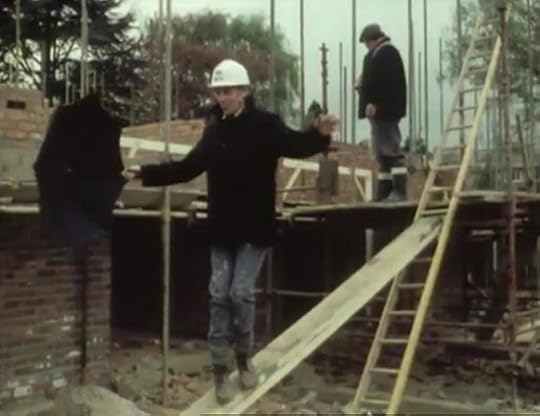
This is endemic of how the subject of Larry’s sexuality is tip-toed around in a pair of hobnail boots. Comedically, it’s the flirty couple at the office, both enjoying the frisson of an unspoken mutual attraction, which will be ruined the moment one of them comes right out and says it. Back to the studio for a Treasure Island sketch, Larry’s dressed as a pirate, on one wooden leg (that’s nailed to the floor), a crutch that’s too short, and no parrot. “I wish I were dead,” he mutters, before his promised bird comes out from the wings.
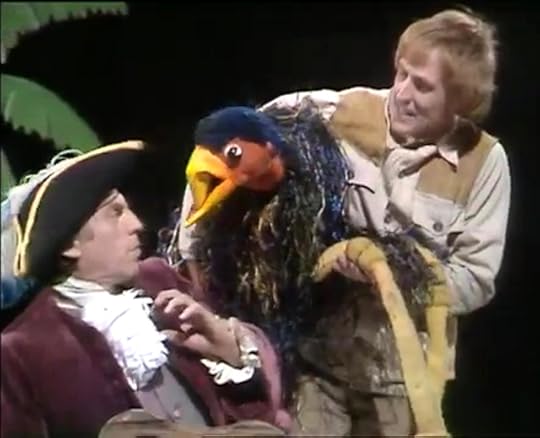
The indignant Larry is the perfect Emu foil, flinching from its bucking head, which, with a tilt, seems to gesture to Rod “ooh, get her!” Of course, they all end up rolling round on the floor like they’re doing UFC, a tangle of limbs and blue raffia, with the audience in absolute mania as a beak rises between Larry’s legs and a floor manager runs on to get Emu’d in the knackers. Honestly, it’s better than anything I’ve seen on current-day TV in the last 12 months.
There’s a requisite News at 10 sketch about a lost explorer, where intrepid reporter Lawrence Grayson is “up the amazon” in a pith helmet, swishing at flies. “Where are we staying? ‘Montezuma’s camp’. Well, I can’t help that…” I suppose your enjoyment will depend entirely on your tolerance of innuendo, because that’s it, that’s the act; only, it’s the best-delivered innuendo of all time; Olympic standard suggestiveness straight from God’s pouting mouth. The unrelenting barrage of double-meanings reminds me of my late grandad’s favourite anecdote, from back in 1949 when he was working on the bins, and sliced himself open on a broken toilet at the rear of a lady’s house. He’d tell it with a twinkle in his eye, always trying — and failing — to keep the corners of his mouth from curling, to play innocent on what he’d written on the council’s accident form. “I cut my hand up Mrs. Geer’s back passage.”
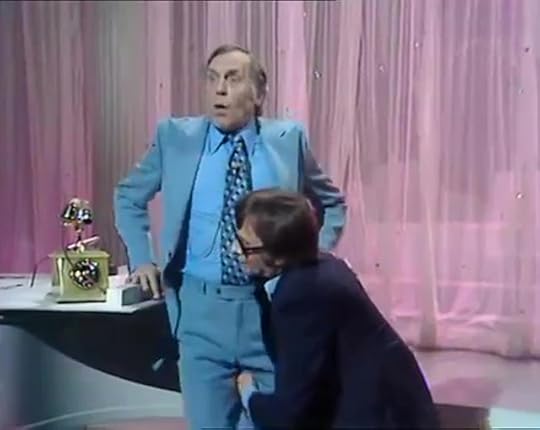
Incredibly for something from the seventies, there’s almost nothing that would get Larry a pre-titles warning of “this show reflects the attitudes of its time” were it repeated today, with the only slightly questionable moment when a shirtless black man runs on dressed as a Zulu (in South America). Grunting and waving a spear, Larry quips “he comes from the Isle of Wight,” though a bit where he says the Zulu’s been watching him through the flap of his tent gives the fabulously evocative line “I haven’t been able to have an all-over wash for the last two days!”
The innuendo keeps coming thick and fast [glance to camera], with a sketch at a computer dating office, where the manager promises “I’m going to show you my supplementaries,” and a look off Larry that leaves me choking on my own spit when asked “how long is it?” (since he first applied) Where has this show been all my life?! Each week’s finale is a closing song, with our boy accompanied by the piano. The tragic clown archetype is overplayed when discussing the offscreen lives of dead comedians, but there’s something undeniably melancholic about these closers, with Larry in a tux, singing Patsy Cline’s Have You Ever Been Lonely, and lyrics that plead “take me back in your heart” to a backing troupe of comically surly men in top hats and tails who turn their backs on him, with one peeling away quickly when Larry threads his arm through his — “how can I go on living, now that we’re apart?”
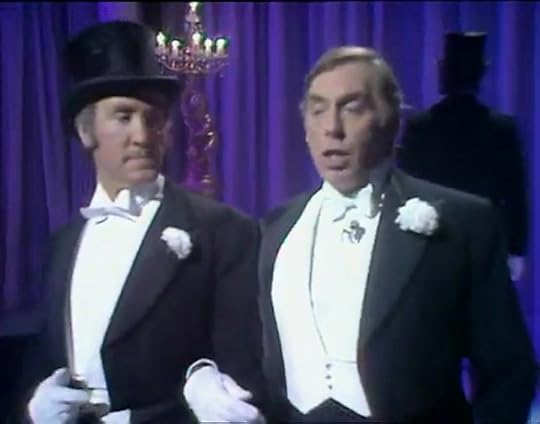
With routines based around a roster of imaginary friends, and the double-entendres of a swinging dandy about town, in truth, Larry had no close romantic relationships, spending his final years living with adoptive older sister, Flo. By all accounts, the love of his life had been an old schoolfriend, killed in battle during WWII, a loss from which he never recovered, carrying a poem about him written by the chap’s sisters in his pocket at all times. But this is telly, and the whole thing’s infused with his comedic beats and deft physicality; a clumsy twirl back to the piano leaving him dizzy. By the end of the song, he’s won them over, with an upbeat key change, and being lifted into the air for the big finish where the men kneel before him adoringly. Larry only truly drops the act to say goodbye, with a sign off of “I love you all very much,” where it’s obvious that he really means it.
A later episode in the first series opens with the words “what a gay day!” before he’s forced to sit down because “my legs are swelling.” Just from his mannerisms, when asking if we’ve had a nice week, a woman can be heard pissing herself, and every scene’s filled with that high pitched “wooohf!” noise by old ladies that used to permeate television tapings like the mating call of a garden bird. With audiences now skewing far younger, no longer comprised solely of coach trips from the clubs, it’s become a sadly extinct sound, like old British police sirens, or a politician’s apology. Series two will give a rare over the shoulder shot, with a glimpse into the seats, and even shrouded in darkness and neon purple lighting, it’s a sea of identical white perms; the rounded heads of elderly ladies laying before him like a cotton field. The enamoured audience give us two brilliant solo reactions for our collection, one after the other.
There’s more joy in that twenty seconds than you’ll find in most entire series, and more smutty allusion packed into the following line than in a Carry On box set. “I’m going to camp. And they told me to rise early, be prepared for anything, and three cheers for the Queen.” Lovely stuff. A chunk of the episode’s taken by a variety act, in a French outdoor cafe set, with Larry in a stripey shirt and beret, pushing on a bike that’s draped in onions. Credited as Yvonne Michel & Erik, it’s uncomfortable entertainment in 2021; a mixture of dancing and domestic violence lucha libra, where they slap each other about, and he shoves her across the studio floor. At points, he’s dragging on her hair and kneeing her head, while she kicks him in the face, slapping the thigh for impact noise like a WWE wrestler. For that full 90’s Hardcore Title vibe, there’s even a headshot with a drinks tray; with Larry catching it in the temple when she rears back, occasionally getting pulled into the fray, and lifted into an aeroplane spin by the muscular male dancer. It ends with them shooting each other dead, while Larry reapplies his beret with a “I never asked them if they wanted any onions!”
He brings out his own group for the closing song — The Takeaways; a pair of glamorously dishevelled old ladies and statuesque drag queen Jean Fredericks — with the audience howling the whole way through. There’s not a fraction of a second free of the sounds of people dying, with uncontrollable laughter from the bleachers, and even his band gone, their shoulders shaking. Skipping forwards to series two, the runtime’s been doubled to an hour, and there’s a change of format to full-on variety. Larry’s opening monologue takes in a Christmas morning cramp, before a drink down at the Cock and Trumpet, where someone stood on the landlord’s Brazil nuts, and there was a raffle to “raise something for the vicar.”
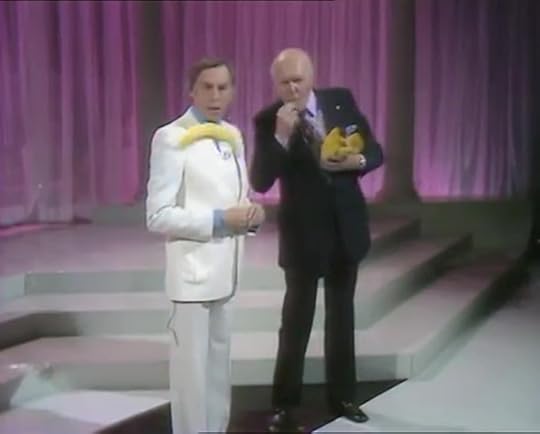
He’s interrupted by magician David Nixon, who does a trick involving a flying banana, presumably because it’s the most willy-like of all the fruits.“I like to do it the hard way,” says Nixon, while Larry scalds a laughing audience with a look that reads “don’t be so disgusting!” Unfortunately, the other acts see him pushed to the side-lines, with singing slots from Vicky Carr and another trick from Nixon (accompanied by an out-of-character Ali Bongo), where Nixon talks about “half inch slots” and a load of spikes you could get poked with, and Larry’s nowhere to be seen. It really is the living end! Incidentally, the trick’s some real Hellraiser shit, wielded by the bald and bulky Nixon who resembles a dress rehearsal Pinhead. He ends up sticking Carr inside the box, and not the audience volunteer, but judging from the massive Cuban heels under his flares, he wouldn’t have fit anyway.
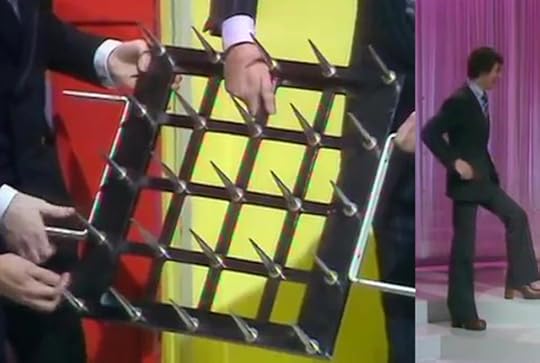
When it goes to some hand-bell ringers and Larry’s still nowhere to be seen, I’m ready to riot. Literal bell-ends being waved about! Shiny clangers! But then, sing Hosannah, there he is, telling the leader he seems like a nice boy, with a “very few people know that I’m a campanologist...” And we’re back, baby! Straight into my top 10 sketches of all time, it’s a delightful masterclass in withering looks and coy aspersions, with Larry holding up his bell to reveal it’s tiny with a floppy handle, complaining that he can’t hear his “tinkle,” and demanding to be given a big one, which he can’t even lift off the table. In a moment I never saw coming, as he takes a bow, a gigantic bell falls from the ceiling and crashes down over him. Five stars, get it on Netflix.
More variety breaks come in the form of a tumbling act called The Veterans, vaulting over an old pommel horse like in PE, to a raucous soundtrack of slide whistles and cymbal crashes. It’s the Grumbleweeds if they took up gymnastics instead of music. There’s a sketch starring a young Vera Duckworth, and Nixon does another trick, involving the loading of a blunderbuss with the remains of Larry’s favourite broach before firing it at him — “the only thing left to do is cock it.” — a request which gets this look.
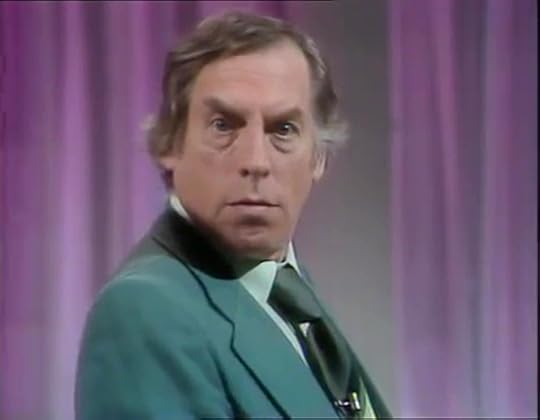
I know Oliver Hardy was doing it first, and that culturally, the straight-down-the-pipe reaction shot has since been claimed by both versions of The Office and its many gifs, but let’s acknowledge the absolute master, who perfected the artform decades ago. The final number, wearing a suit the colour of summer skies, is Irving Berlin’s All Alone — “all alone, I’m all alone, and there’s no-one else but you…” Constantly interrupted by a ringing phone — wrong numbers and perverts — Larry segues into Berlin’s What’ll I Do, aka the theme to Birds of a Feather, with a fantastic bit of business where he hops on the piano but can’t get up unassisted, having to slap away the handsy pianist who heaves him up.
We end on Larry’s head framed in a spotlight against the encroaching darkness, wondering aloud “if you are all alone too.” Knowing of his life, and the abrupt end to his career, there’s something unspeakably sad about these musical numbers, and as he earnestly thanks — at length — each of his guests, and everyone involved in the show, signing off with another “ta-ra, and I love you very much; ta-ra, I love you,” I don’t know if it’s just this Hell-world we’re trapped in, but I’m fucking sobbing.
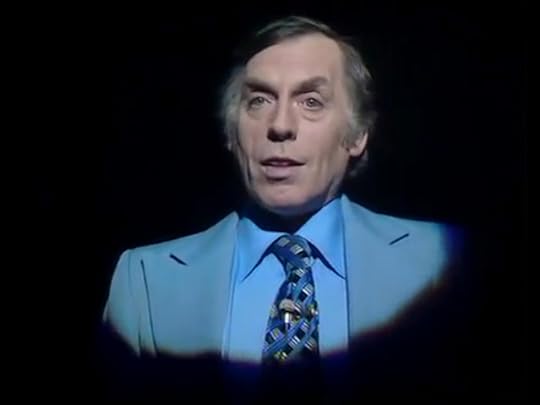
The following year, Larry would land the plummest role on the box, as host of The Generation Game, after Bruce jumped to LWT for his own disastrous variety show. When the pair went head to head, Brucie got trounced by his successor’s wildly popular run, but in 1981, Larry quit too, citing a desire to go out on top and not wanting the show to become stale. But by then, the march of alternative comedy had broken over the horizon, and his winking allusions were considered old hat. Depression set in as the work dried up, limited to little more than a few scattered guest spots, pantomimes, and in 1987, a failed ITV gameshow titled Sweethearts, which was sacrificed in a death-slot against the juggernaut of EastEnders.
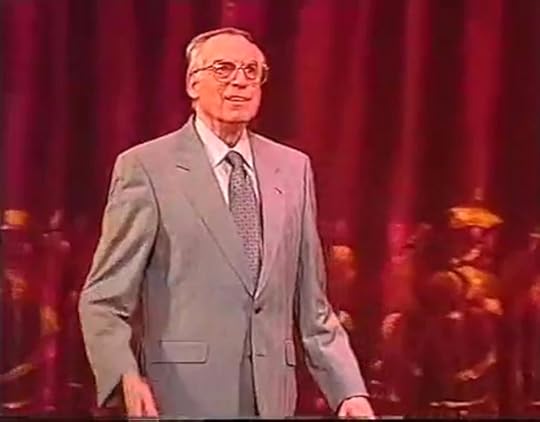
Two months before he died, Larry made one last appearance, at the 1994 Royal Variety Performance. Now seventy, emerging from the wings with the trademark chair, his opening line is a catty and self-effacing “I thought I was dead!” Sadly, history recalls this as a bad performance, which fell apart and played to silence, but that doesn’t bear out from watching it. Yes, his timing’s not quite what it was, and he loses his place a couple of times, but it’s all there. The rambling whimsy; the intentional disarray; there’s a mention of Slack Alice, and asides about “my leg’s giving me ‘ell,” moaning about a draft, and getting fixated on something he’s trodden in. As the short routine comes to a close, he jokes (or not) that “I’ve only come out so you can see i’m still alive,” and that he’s doing it for all the letters he gets, “from the lovely people at home. I’m alright, you see. So here I am. It’s lovely being with you.” And with a “shut that door,” blowing kisses to the audience, Larry Grayson’s final “I love you” is almost lost; drowning beneath the applause.
…
This piece first appeared on my Patreon, where subscribers could read it a month before it landed here. If you’d like to support me for as little as $1 a month, then click here to help provide the world with regular deep dives about weird-bad pop culture, early access to my podcast, and all kinds of other stuff.
There’s a ton of content, including exclusives that’ll never appear here on the free blog, such as 1970’s British variety-set horror novella, Jangle, and my latest novel, Men of the Loch. Please give my existing books a look too, or if you’re so inclined, sling me a Ko-fi or some PayPal cash.
January 21, 2021
Jim Davidson’s Adult Pantos: Closing the Cursed Trilogy
[Part I: Sinderella — Part II: Boobs in the Wood]
…
This video first appeared on my Patreon, where subscribers could watch it a month before it landed here. If you’d like to support me for as little as $1 a month, then click here to help provide the world with regular deep dives about weird-bad pop culture, early access to my podcast, and all kinds of other stuff.
There’s a ton of content, including exclusives that’ll never appear here on the free blog, such as 1970’s British variety-set horror novella, Jangle, and my latest novel, Men of the Loch. Please give my existing books a look too, or if you’re so inclined, sling me a Ko-fi or some PayPal cash.
January 11, 2021
An Accursed 90’s Christmas
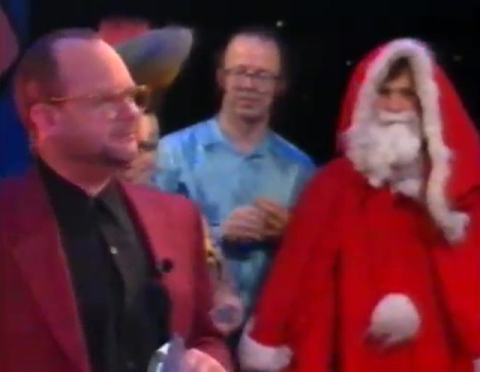
[More Accursed 90s: Televised Lad Contests — Don’t Forget Your Toothbrush — Talk Show Goths — James Whale on Television — Craig Charles’ Funky Bunker — The Word — The Girlie Show]
It somehow feels dirty letting the horrible 90s get their lager and spunk-covered hands on Christmas, but I regret to inform you there were at least ten of them held in that decade. To get a sense of what a 90’s Christmas was truly like, I’m afraid we must return to some of our previous haunts from that most desolate period, beginning with the televisual stylings of James Whale.
If you read the original piece, you’ll recall Whale’s presenting style is that of a man who neither knows nor cares what’s happening on his own show. Every cue, every link, is either late or incorrect; he can’t make it through three words without getting distracted; and spends his time glancing off-camera to ask what’s happening or to berate the crew. Over a soundbed of awkward silence and people loudly talking over one another, Whale’s onscreen excursions are some of the worst television ever made. 1993’s Whale On Christmas Party takes that atmosphere of perplexed disorder, and adds even more bodies to its eclectic crowd of chuntering gobs, along with copious amounts of booze.
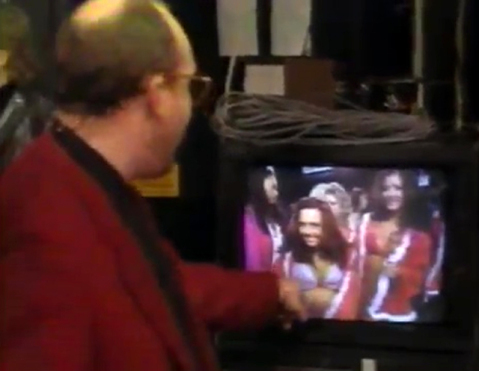
We open with Whale in a carpark, flanked by models in Christmas robes which hang open to show their underwear. Marching everyone inside, he dicks around with a control panel for the cameras, erupting into a cheer when it lands on a close-up of a cleavage. There’s a full party in swing on the studio floor, packed with revellers in a Mos Eisley Cantina of Whale’s in-house tabloid tribe. Underwear models stand side-by-side with panto dames, civilians in fancy dress and feather boas, and Beano-style punks with foot-high mohawks, all with glass in hand and mingling with the great and the good of British showbiz’s basement.
Screaming Lord Sutch, in full regalia as ‘celebrity floor manager’, mingles beside Irish singer Rose Marie, camp MP Jerry Hayes in a ballgown, and Doc Cox off That’s Life. “I see Tony Blackburn over there!” yells Whale, pulling weathergirl Sian Lloyd out of the crowd and ordering a close-up of her sexy mouth. She helps him read out a competition, where he tells us to “ring that nimber… number.” It’s clear from the off Lord Sutch is massively sozzled, and in the night’s worst decision, he’s been given a megaphone and head-mic. Subsequently his drunken witterings permeate proceedings like a neighbour’s fucked car alarm. Wobbly as he is in the beginning, as the show progresses, he’ll give Charlie Drake a run for his money.
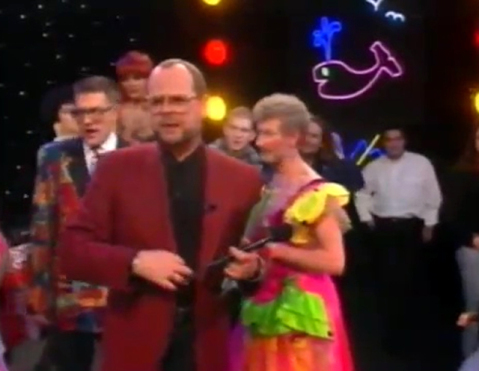
Whale moves everyone back, for Charlie Chuck’s outsider art cover of Tommy Cooper’s bottle routine, ending abruptly with Chuck swinging a plank and sending glass flying into the crowd. “He’s a walking haystack!” bellows Sutch into his megaphone, again and again, until Whale orders he calm down. “Alright,” shrugs Sutch. Not even ten minutes in, Tony Blackburn looks shell-shocked. You don’t get this on Noel’s House Party. Perhaps that’s why he steps in to calm the mood with his party piece, a song familiar to me from many guitar-toting Christian youth leaders, in a childhood spent on the fringes of the church, which goes thusly — “there’s a worm at the bottom of the garden, and his name is Wiggly Woo!”
Blackburn is a doe-eyed innocent in Whale’s sordid carnival, joyously leading an acapella sing-a-long of a ditty of which nobody (at points, not even him) knows the words, with the shambolic, embarrassing energy of a teacher standing up at Christmas assembly to serenade the room with a sea shanty. Inexplicably, Whale invites Rose Marie to help Tony perform the entire song again; Sutch stood swaying with his microphone, and Blackburn kicking his legs with such ferocity, if a shoe flies off, it’ll bring down the ISS. After agonising minutes of Wiggly Woo, Blackburn’s push for a second encore is mercifully shut down.

In more banter, a drag queen tells Whale she hopes to get stuffed, and Doc Cox gives a quick Wiggly Woo on his uke. Whale pushes past, over to porn star Linzi Drew. What would she like for Christmas? “Me two front teeth… I’ve already got them… um, I dunno…” As a bored Whale leaves, she yanks him back to add “a long, big and thick surprise!” (she means an erect penis) “Okay, fine,” he huffs, informing us a now distinctly queasy-looking Sutch is “not so well at the moment.” An absolutely hammered Sutch assures us “I’m alright, I’m… I’m doin’ alright, I’m working it out,” while in the background, Tony Blackburn can be heard singing Wiggly Woo.
The Whale On party serves up cursed moments like a rotten buffet; a prolonged dance number from male strippers the Dream Boys, shagging at the air, floor, and faces of women sat front row; Peter Straker with a warbling O Come All Ye Faithful, where even the word “Ye” has fifteen syllables; a troupe of Page 3 girls flashing their bras and knickers in another ‘dance’ routine which devolves into a giant conga. Perfectly capturing the grotty office party vibe, the conga line weaves in on itself on the cramped studio floor like Snake on an old Nokia; a kicking flesh sandwich of underwear-clad girls and middle-aged men; Tony Blackburn, porn star Charmaine Sinclair, Doc Cox.
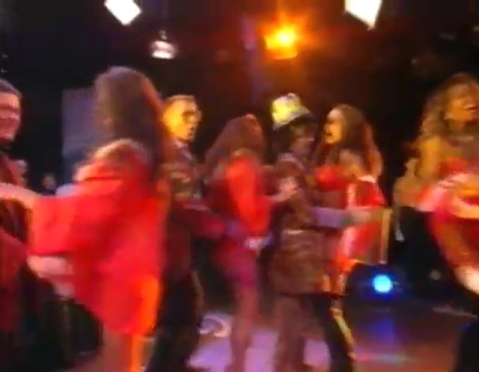
As Whale wanders the studio like an elderly dog searching for somewhere to die, Sutch is at his side, slurring nonsense about drinking a cup of tea; “I, I, I… dunno what’s happening?” Me either. At this point, everyone’s had a few, and our host has terrible trouble corralling them onto their marks for the panto finale. For maximum 1993 laffs, their Cinderella’s set in Chigwell with Shazarella (another 6’1” drag queen), but everyone’s so pissed-up and boisterous, Whale’s witticisms about Essex girls being thick slags are lost beneath a barrage of restless shouting and breakouts of Wiggly Woo. To make everyone feel better about our current-day world, we close with Whale telling us he’ll be back in the new year with a show about “political correctness,” as everyone; half-naked Page 3 girls, towering drag queens, Screaming Lord Alcohol Poisoning, and Tony Blackburn, gather round the piano for another go at O Come All Ye Faithful.
But at least ITV knew how to do a proper Christmas, following tradition with cosy trailers of their most bankable faces in festive jumpers under superimposed snow, and idents with holly and robins, and Victorian boys sledding down a hill. Channel 4 on the other hand, chose a more… eclectic flavour, filling schedules with stand-up shows from brash Americans, and films your parents wouldn’t want you renting from the local Video Paradise. Viewers who didn’t fancy the Queen’s speech could flick over at 3pm for an alternative message, exemplifying the channel’s dual personality, with a mix of right-on politics and contentious figures from the year’s headlines. In its 90’s airings, the platform went to names like Quentin Crisp, Ali G, Rory Bremner (impersonating Princess Di), and the parents of murdered black teenager, Stephen Lawrence. It was precious rare grandparents who’d let that on in place of Her Madge, in the boomer TV equivalent of “foreign muck.”
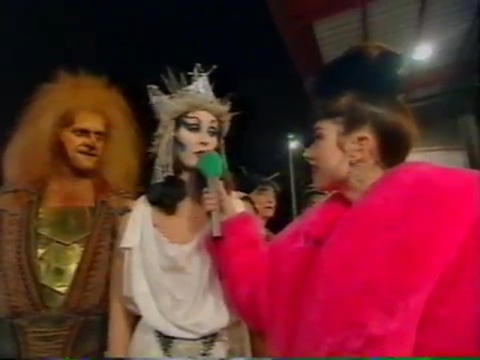
As the channel most likely to put a great big dildo in the office secret Santa, it’s appropriate that one of its biggest brands, The Word, had its own seasonal special, airing on actual Christmas Day, 1992. So, while the BBC were pressing play on Victoria Wood and Shirley Valentine, over on Channel 4, The Word‘s opening titles were kicking off, where a man burst a rubber glove over his head and a young Max Beesley frantically banged on a set of bongos, with everyone looking like they’d quaffed a bucket-load of E’s. At least there’s no tit-sucking, as would feature in the 1995 intro.
For tonight’s panto theme, Terry Christian infers two ladies in the crowd are ugly sisters, and yanks a bloke out to get “a lad in… Aladdin, get it?” as Katie Puckrik tells him “Yule never improve!” Is this The Word, or Chucklevision? Come on, someone drink from a still-warm condom! First guest, described in his intro as “the strangest accent in movies today,” is Dolph Lundgren, and sat on the sofa with Terry, it looks like Gandalf and Frodo at breakfast. Terry has not an ounce of creativity in his bones, opening with the dullard’s ‘wrestler/boxer/big guy interview’ standard “I’d better be nice to you, or you’ll beat me up!” Later, when name-dropping the director of Gandhi, he’ll utter the words “Richard ‘luvvie darling’ Attenborough.” The highlight of a terrible interview is when Dolph pretends to throw a punch at Terry, causing him to flinch wildly.

Mostly, it’s business as usual, with the true Christmas meat found in their celebration of panto, following an open invite to the stars of every theatre in the country. Consequently, backstage looks like the Garden of Earthly Delights as painted by Christopher Biggins; mince pies, mulled wine, a terrifying cat-beast from Puss in Boots, Simon Groom from Blue Peter; multiple Nolan sisters from multiple pantos, CBBC’s Simon Parkin, and dozens of little people in elf outfits. The American Puckrik’s deeply confused, with interviews conducted at cross purposes, drowned out by the carols of drunken revellers. A car pulls up containing Carmel off EastEnders and Sabra Williams from Ghost Train, and as a pantomime cow tumbles out of the back seat, they break into a rap.
“We’re MC Rapper and Pinocchio,
we’re here from the shore, dontcha know?
we’re on until January nine,
so come along, and you’ll be fine; YO!”
Biggest takeaway here is what a fabulously lazy name MC Rapper is, like Dr Doctor. Next guest is Milla Jovovich, dropped into the carnal fight club of The Word having turned 17 the day before. “Seventeen and never been kissed,” says Terry. “Not by you!” she zings. Evoking memories of Liv Tyler’s appearance, his opening question is whether she’s attracted to older men; say, ten or twenty years older? I can’t hear what Dolph says, but Milla jokingly slaps and shoves him, with a “your girlfriend’s gonna kill you!” But Milla’s more then they can handle, armed with a plastic yellow hammer with which she beats Dolph over the head. “Jesus Christ,” he says, “all because of last night?” licking his finger and striking an imaginary point against the air as the audience bray. Even in the Word’s anything goes atmos, Terry knows he’s lost control, pleading she “please behave yourself,” before squealing in pain/fright as she smashes him in the knee. In the chaos, Dolph hands Terry a fruit flavoured condom, which he gives to the 17-year-old.
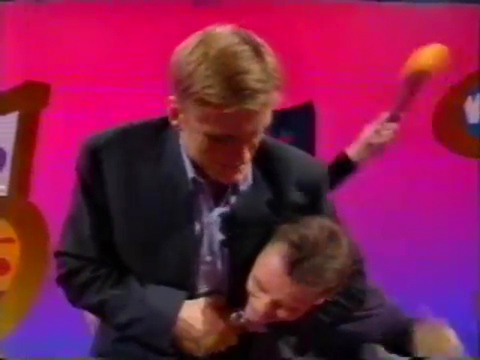
Later, Milla accidentally says “fuck,” covering her mouth as the audience ooh like someone dropped a glass at a pub, and we cut back from the final ad-break to find Terry in a Dolph headlock; a bit that’s broken up by Milla cracking Terry over the head with the hammer, really, really hard. Final guest is boxer Nigel Benn, who they immediately humiliate by showing a Playgirl shoot where he’s got his arse out and naked cock covered with a boxing glove. “That’s very nice, isn’t it, Milla?” asks Terry. “I wouldn’t know,” she says, “I’m just 17.” At this point, someone in the production booth obviously realises it all looks a bit noncey, as Terry pushes a finger in his ear, trailing off with “I don’t know,” and moving on very quickly. Benn’s an ill fit for the show, with a dour interview playing to silence, until he calls Chris Eubank “a pig,” inciting cheers.
Back in pantoland, they’re joined by Kodi from Neighbours, Tony Monopoly (me either), and Bucks Fizz’s Mike Nolan. Christ, a fire in the studio would’ve devastated the British Christmas industry for a good decade. Barbara Windsor’s the Fairy Godmother, leading everyone in a sing-along of Nat King Cole’s Christmas Song, where a self-conscious Nigel Benn, arms folded, gets through his solo line like a man pleading not guilty to a string of child murders. A flurry of fake snow falls from the ceiling, but far too aggressively and straight into people’s mouths, and as Babs gives it large, Mike Nolan can be seen retching at the edge of frame, batting it away like he’s being attacked by wasps. We go off air to the sound of Carmel from EastEnders‘ voice, heard above the carolling, with a half-laughing, half-revolted “I can’t breathe!”
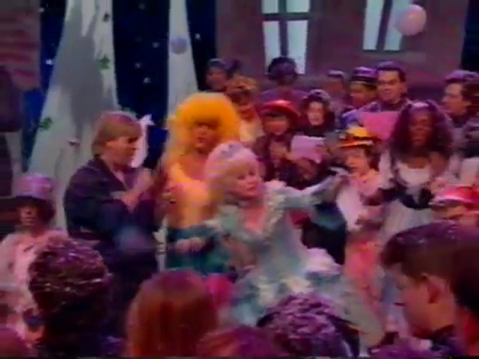
As a horrid 90’s stocking filler bonus, let’s drop in on another infamous Channel 4 show, and a frequent point of reference on here, Eurotrash. Despite 153 episodes in the can, online footage is rare as angel cocks, as I doubt you could find a full thirty seconds which didn’t break YouTube’s rules on nudity. For the generation of British men who spent their early teens in the pre-internet dark ages, back when actual pornography was literally illegal in the UK, the post-parents’-bedtime borderlands of Eurotrash were many chaps’ first proper exposure to actual fannies and that. More kitsch than perverse, it was tongue in cheek and knowingly, joyously garish; a high camp Mondo, celebrating the wonders of the continent, before everyone got online and became as deviant as each other. That said, the show mostly consisted of naked foreigners dubbed with funny voices and men who painted portraits with their own shit.
The Eurotrash Christmas special dates from 1997, opening with German musical group Die Jacobs Sisters, a trio of older ladies in Santa suits holding sleepy poodles and singing over techno. Hosting solo after Jean Paul Gaultier moved on, is its creator, Antoine de Caunes, one of the early 90’s most impersonated men, thanks to easily-copied attributes of speaking with a French accent with his arms behind his back, on BBC2 yoof show, Rapido. Though fluent in English, de Caunes flowery, alliterative dialogue for his “gullible British chums” took the form of swipes at our uptightness and “terrible sexual reputation,” which considering the whole ‘grot was illegal’ deal, was well deserved.
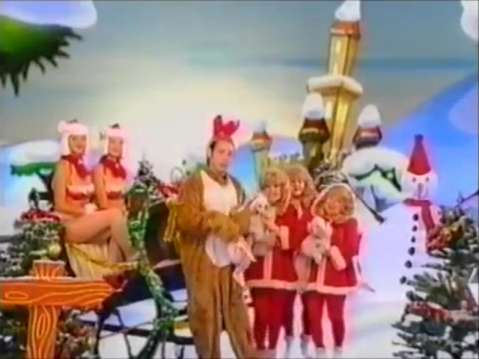
Dressed as a reindeer and pulling a sleigh filled with underwear models, we’re straight into a gift buying guide with French model, Lova Moor, as an excuse to show to her rolling on the grass in the nip. Moor’s emblematic of Eurotrash‘s role as spiritual predecessor to Tim and Eric Awesome Show, Great Job!, with a supporting cast of oddballs from the fringes of European showbiz, their awkward pauses, asides to the crew — “that was okay?” — and goodbye waves that go on far too long, all kept in the edit. Featured Whack Pack member this week is elderly Belgian singer Eddy Wally, shilling his CD of Chinese-language songs, and looking like ‘Fluff’ Freeman with jet black printer ink slicked through his hair.
It all feels like you’ve been dropped into the after-hours of a weird 60’s euro cartoon, with puppets, wonk-angled, lurid backgrounds, and extremely Carry On voiceovers rambling on about “hard willies.” It tears through segments with the speed of a schoolboy flipping through his dad’s jazz mags before he gets back from the shops, with roughly the same amount of bare flesh and pubes. There’s a nude pseudo-aerobics video, with flopping tits and great big wangers, a naked hippie with his balls out, and an Austrian inventor who made a spinning coffee table with a hole in the middle you can do sex through.

Even a Santa convention — filled with requisite jokes about coming down chimneys or only once a year — has Mother Christmases hiking their skirts, a pink-bearded Santa distributing condoms in the street, and a beach Santa, giving the opportunity for zooms on thonged bottoms and oiled boobs. Covering the scatological, there’s the Catalonian tradition of pooing in nativity scenes, with one featuring a human pooer; a bricklayer “who’ll be laying bricks of a different kind!” Antoine closes by interviewing a female director/star of amateur pornos, back in prehistoric 1997, when people taking nudes of themselves were still a wild phenomena, and not a daily occurrence for half the population. Her responses are dubbed with a Thatcher-esque voice by Kate Robbins; bons mots like “English guys have thinner dicks than French guys,” and as it’s Christmas, she’s wearing a Santa hat, with one of her nipples hanging out.
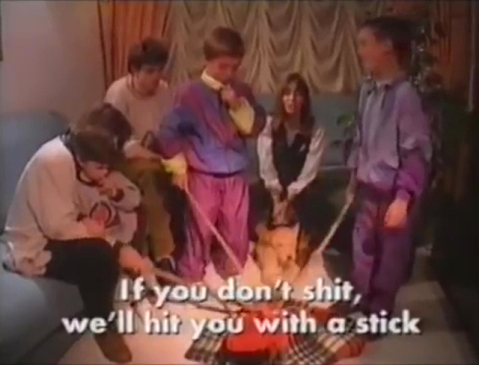
We’re played out by Die Jacobs Sisters, as the models toss fake snow out of buckets, a plucked turkey is puppeted into a high-kicking jig, and de Caunes pretends to bum a pantomime cow. Honestly, it seems rather quaint now, and even considering all the dicks and tits, oddly innocent.
In terms of sheer faux-casual gratuitousness, it doesn’t touch fellow 4 show Naked Attraction, or men getting out their glistening micropenises for the Embarrassing Bodies doctors to bend over and sniff, in glorious HD. I was out walking a dog the other evening, and while he weed against someone’s gate, I glanced up at the window, where an enormous 4k TV, with the Channel 4 logo in the corner, had its entire screen filled with an erect woman’s nipple, individual bumps on the areola visible from my position on the street — and it’s all perfectly normal. What cruel irony. No sooner did we finally start fitting in with our European brothers and sisters, than we have to leave.
…
This piece first appeared on my Patreon, where subscribers could read it a month before it landed here. If you’d like to support me for as little as $1 a month, then click here to help provide the world with regular deep dives about weird-bad pop culture, early access to my podcast, and all kinds of other stuff.
There’s a ton of content, including exclusives that’ll never appear here on the free blog, such as 1970’s British variety-set horror novella, Jangle, and my latest novel, Men of the Loch. Please give my existing books a look too, or if you’re so inclined, sling me a Ko-fi or some PayPal cash.
January 1, 2021
The Mike Yarwood Christmas Show

In the history books of light entertainment, the name Mike Yarwood is invoked almost entirely as an example of being massively famous and successful before suddenly disappearing, never to be seen again. I’ve only the vaguest memories of watching at the time, aware of his work mostly through retrospectives, which cover the swiftness of his retirement, peppered with clips of him taking off now-long-dead politicians. In my head, Yarwood’s is the beige coloured comedy of centrist dads; a torch picked up off the floor by Rory Bremner, whose shows I sat down in front of as a kid, expecting laffs but finding stuff about interest rates and “imagine if Paddy Ashdown did a rap! (about interest rates)” For a proper reappraisal, I’m watching a pair of Yarwood’s Christmas specials, beginning with a show dating from Christmas Day, 1977.
We cold open on a message from Prime Minister James Callaghan, in a bit most notable for digs at Thatcher, with a joke about whether he’d kiss her under the mistletoe — “I wouldn’t kiss her under aesthetic!” Six years later, this gag would be reused on the Krankies Christmas special, but with Wee Jimmy’s teacher and chloroform. As becomes really clear if you watch enough of this stuff, it was a period when nobody owned a joke, and comedians on TV were just like the comedians in pubs, offices, and playgrounds; everybody repeating stuff they’d heard from someone else. Plagiarism didn’t exist until the 1990s, and even then it was copied from somebody who did it in the 80s.
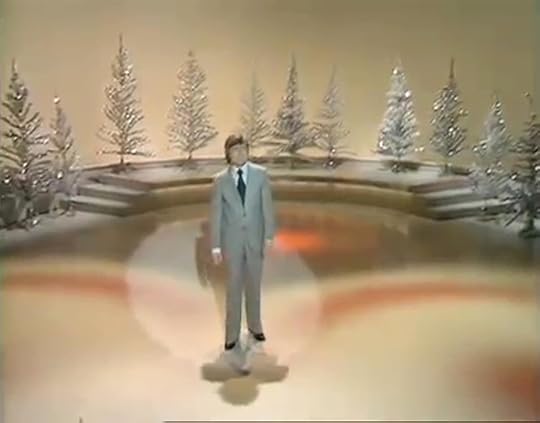
Yarwood as Yarwood enters onto a barren stage with a backdrop of bare white tinsel trees, which give a strong ‘stumbling through the poisoned woods during a post-apocalyptic nuclear winter’ aesthetic. He’s got tremendous Lego hair, and looks very pleased with himself over a joke about Callaghan cooking a Christmas cake — in the oven for six hours but only rising 10%. Somewhere, a young Rory Bremner was laughing heartily. Now, as regular readers will know, I’m fascinated by the creative decisions impressionists take to ensure the audience knows who they’re doing. It’s tantamount to an admission of failure, with the most egregious the good old opener “my name’s…” Many of these signposts are on hand in the first big sketch, showcasing a number of Yarwood’s take-offs, via clever — at the time — use of split screen, allowing him to interact with himself.
It’s the textbook setting of a celebrity party, which illustrates how the country’s most famous mimic really struggled with the easy ones. John Cleese is a standard of every comic’s arsenal; exaggerated leg movements and going “Right! Right!” while bouncing up and down on your heels. But Yarwood’s silly walk isn’t remotely silly, and his Cleese ‘thing’ is speaking through clenched teeth like a ventriloquist dummy. Without the signifier “welcome to the party, Mr. Cleese!” you’d have no idea. Even Davro’s is better. Even Davro’s! His Brian Clough’s less bad, but still requires a trackie with NOTTS FOREST on the front in big letters. Then Frankie Howerd says “ooh!” and whatnot, before introducing the star guest, “Mr. Sammy Davis Jr!”
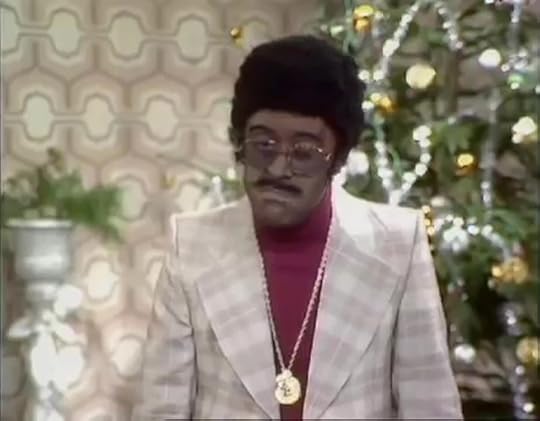
Oh. Yarwood then does a duet with himself as a blacked-up Sammy. As the other characters join in, there’s no joke, other than I Could Have Danced All Night being sung in approximations of celebrity voices. Then we’re straight into a panto sketch, with the title card JACK AND THE PAY TALK, where 70’s comedy bit player Jenny Lee Wright welcomes us to Union Land. This is Bremner Defcon 1! I mean, Wright’s listed in the cast as Local Union Negotiator, and the wicked baron is “evil Enoch Powell,” although to give Yarwood credit, he’s probably the only impressionist to jump straight from Sammy Davis Jr. to Enoch. Rather than going for, say, the fascism, Yarwood plays him like a generic money-hungry politician, slagging off Labour, and with the catchphrase “Enochy nick-nacky, nicky nacky noo!” so it’s like stumbling across a skit from a 1940’s comedy troupe that focusses on Hitler kissing his niece.
With Enoch putting up the rent, trade unionist Jack Jones rides in on a pantomime cow, with gags about striking, withdrawing labour, and time-and-a-half. With the weird non-humour, bad acting, and constant references to workers’ rights, it feels more like a workplace training video than a sketch show, and I’m half expecting Scargill to wander on and show me how to use the clocking-in machine. Michael Foot shows up, bragging that he’s “one of the idle rich.” Asked if he’s a landowner, Foot replies “no, I’m on the dole!” which gets a very aggressive round of applause from a handful of audience members, no doubt very keen on bringing back National Service. The cherry on the cake is the giant on top of the beanstalk; Yarwood in a fat suit as Cyril Smith. Or to give him his full title, notorious dead serial paedophile, Cyril Smith. It’s shocking to me we’ll get through the two shows without Savile putting in an appearance.
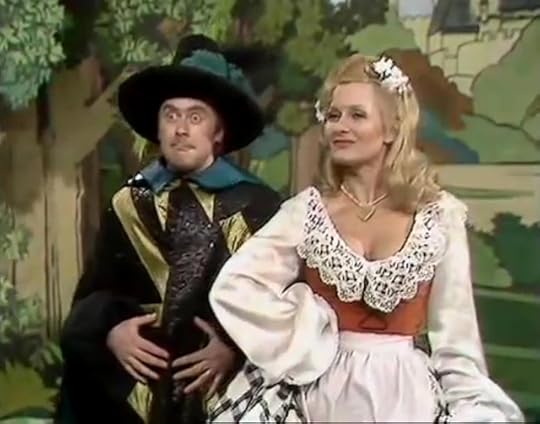
There’s a welcome break from the murderer’s row of voices, as Yarwood introduces some very special guests with their new hit record, Wings, and — oh, it’s actually Paul, Linda, and Denny Laine (the latter in a Rodney Bewes tuxedo shirt), singing Mull of Kintyre for real, and not Yarwood willying about with a prop guitar and Joey Boswell accent. I know Linda got a lot of shit over a perceived lack of contribution to the band, but someone made the decision to have her sit between the other two with a mic on her lap, not doing or saying a thing for the whole first two minutes of the song. They stick around for a sketch with Yarwood’s Denis Healey — then chancellor — who’s dressed as a punk; studded collar, denim jacket with a patch of Karl Marx, safety pin through a bushy eyebrow; “I got tired of being a silly billy, so I decided to become a chunky punky!”
I’m no political history buff, but I reckon that must’ve brought the entire dang system down. Incidentally, “silly billy” as a Healey catchphrase was entirely a Yarwood invention, but it took off so much that Healey started working it into his speeches for real. Anyway, he sits backwards on a chair like A.C. Slater and says he’s changing his name to Johnny Rotten, while Callahan is Sid Vicious, which all gets big laughs, as Never Mind the Bollocks only came out two months earlier. Though modern day Paul McCartney resembles the confused King of the Wood Elves, in 1977, he at least looks as much of a comedian as Yarwood, with a rotten gag about writing Healey some “eyebrow (high brow?) music.”
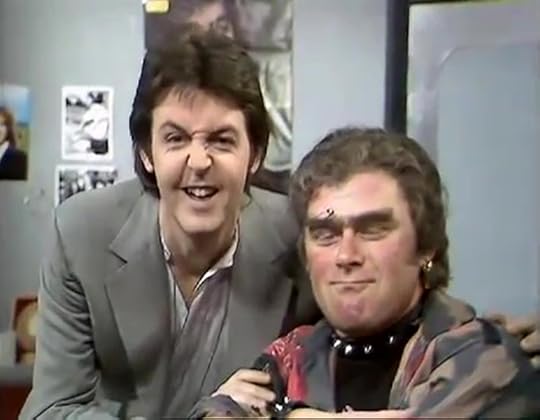
Of course, Big Mike does bust out his most famous character, Prince Charles, which stood out as the Charles amid a landscape of Charlie Windsor impersonations; everyone moving their stiff hands up and down and going “errrr” from the sides of their mouths. It’s a topical routine which must’ve taped close to transmission, with jokes about Princess Anne’s new baby — Peter, born on Nov 15th — with a line “for Pete’s sake” which gets an actual aww from the audience, like they’re watching The Big Bang Theory. What’s probably the show’s best gag is hiding in here; a line about decorating the tree by giving it a knighthood, and one about the baby, who’s “only a few weeks old, he knows all about the Royal we(e).”
A final song runs us through a gamut of of voices; Perry Como, Dave Allen, Eddie Waring, Bruce Forsyth, Frank Spencer, Frank Spencer doing John Wayne; confirming again that he can’t do the easy ones (and perhaps not the less obvious ones either, who I’m unfamiliar with). Honestly, all of us could do much better Brucies. Come on, Mike, it’s the easiest one! “Thththththth, good game, good game!” His Frank Spencer’s shit too, while Dave Allen’s portrayed via the tic of constantly brushing fluff off his trousers, and tells a joke about the Irish being thick. Ending an exhausting routine, he sings a Christmas carol as Ted Heath, My Way as Harold McMillan, and bids us “tatty bye!” as Ken Dodd.
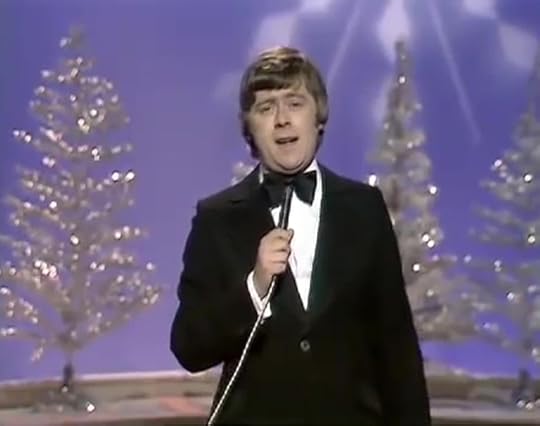
Though this is my first time properly covering Mike Yarwood, I’ve referred quite frequently to the “and this is me” moment at the end of each show, where he drops character to do a song as himself, in what can most politely be described as earnest yet terrible club singing. The “and this is me” is the standard by which all earnest songs by comedians must be judged, and they all did it back then, with TV’s comics coming up through the working men’s club scene, meaning if you did comedy, you sang too. Even Bernard Manning had a single, while Jim Davidson released two albums and seven singles, including White Christmas — sung in his Chalkie voice — and Much Too Late For That (The Nagging Woman Song). As recently as the nineties, Jim was ending shows with a heartfelt duet with his own son, which left him dabbing at his eyes like he’d just had to toss out a whole fortnight’s worth of grocery shopping because the Tesco delivery man was black. For Christmas Day 1977, Yarwood, mask off, exposed and raw, croons a rather unfestive Sunshine of My Life.
Though the truth of Yarwood’s withdrawal from the limelight resulted from a number of factors, including stage-fright, alcoholism, and the changing tastes of the audience, when seeing a roster so heavy with blustering old male prime ministers, you can understand the theory that he jacked it in when he realised he couldn’t do a good Thatcher. Speaking of witch… sorry, which, the VHS rip containing 1978’s Christmas special confusingly opens with live footage of BBC’s election coverage from the night she was first voted into Number 10.
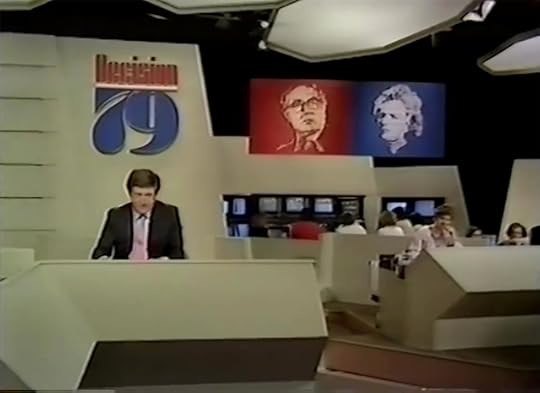
A young, dark-haired David Dimbleby, under a backdrop reading DECISION 79, informs us that, as nothing much is happening while the votes are counted, they’re cutting over to a Mike Yarwood Christmas Special — in May, mind you. That would be unthinkable nowadays, when you could fill all that precious dead time with endless speculation and waffle. Weirdest of all, the footage on this tape dates from mere hours before I was born, making all of Yarwood’s references to “this very special day” seem like he’s on about the momentous occasion of my birth; the fulfilling of a great prophecy about a boy who would grow up to save the world by crowbarring dick and spunk jokes into essays about shit old telly.
Fittingly, the setting for our first sketch is the door of Number 10, with Callaghan poking his head out with the security chain on to tell some carol singers “go away, I’m not coming out!” and “I might’ve known you’re not from the conservative party, you’re all singing the same tune.” But with the looming ghoul of Thatcher so unavoidable, Janet Brown was drafted in to play The Hellbeast, opposite Yarwood’s Parkinson. Parky (quite correctly) refers to himself as “a male chauvinist pig,” and his wig’s very ‘middle-aged Paul Weller fan only has access to the kids every other weekend’. The whole routine’s about Thatch being domineering, with a simply awful gag-quality, like this one about being the proud mother of twins; Parky: “And what did you call them?” Thatcher: “Children.”
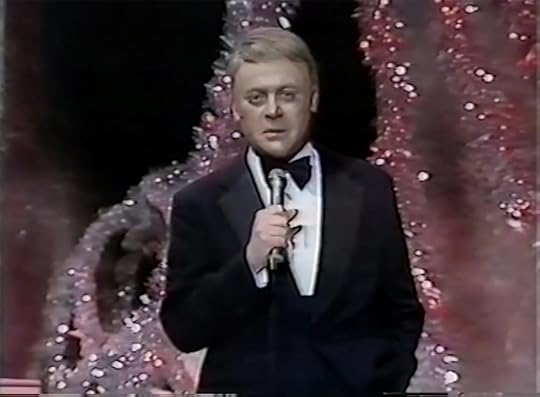
A satellite link sketch gives Yarwood the chance to do celebrities from the US, all the while holding onto his American accent like a man whizzing down a Slip ‘n Slide with a bowl of fruit. His Sinatra looks like Sluggs from This Country, while his Bob Hope is a textbook example of impressionists telling bad jokes through the mouths of other, better comedians — “…all those Arabs are causing problems for your traffic wardens in London, I mean, where do you stick a ticket on a camel?” The Arabs get a rough ride in these shows, and later there’s a joke about an Arab prince who bought a dairy and became “the world’s first milk-sheik.”
A news review of 1978 sees him struggling to get through the hilarity of sub-Two Ronnies gags about a round the world yachtswoman taking a lap of honour, striking bakers who “(k)need the dough,” and an Irishman eliminated from the Best Butcher contest after spending eight hours trying to hang up mince. A bit about manure and Big Ben going “DUNG!” has him properly corpsing, and I’m glad someone’s laughing. Who knows, maybe that was the one to break my mum’s waters? There’s also a headline about British TV programs having been “sold to red China.” Red China? Alright, Trump. If it’s comedy from the seventies talking about China, we all know what’s coming. And those shows are… “The Two Lonnies, The Lag Trade, and of course, Rittle and Rarge.” Yarwood’s so amused by this, he breaks character.
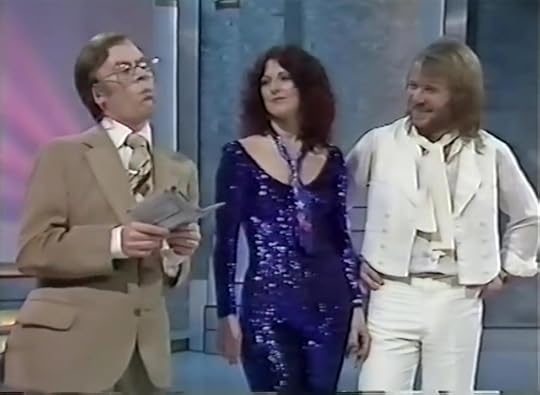
Special guests this year are ABBA — “ladies and gentlemen, two girls, two boys, a phenomena in pop music…” But I’m dying of shame when they join him for a Generation Game sketch, in Britain’s worst crime against another nation’s people since the days of the Empire. Yeah, Larry Grayson was camp, but Yarwood might as well just have him cottaging, the way he plays it; leg cocked and wrists limp, sucking in his cheeks, all “what a gay day!” like Ricky Gervais’ panto genie in Extras. He hits on ABBA’s Benny — Larry: “What songs have you done?” Benny: “Take a Chance On Me.” Larry: “Oooh, ain’t he forward?!” — eyeing him up with an “ain’t he big?” It goes on for ages, bantering as ABBA get laughs doing Larry’s catchphrases, which feels odd because it’s not Larry, it’s Mike Yarwood; a real band playing with a covers act.
The last big sketch is a crossover with my blog, in a parody of the disastrous Bruce Forsyth’s Big Night. His Brucie hasn’t gotten better in the intervening year, although he has glued some pubes into a wig/tash formation, with corpse-like make-up which resembles a sickly Keith Lemon. Mimicking Big Night‘s amateur jokers section, politicians tell boring, meandering gags that go on forever, quickly becoming the very thing it’s satirising, with Michael Foot played as Max Wall, Harold Wilson as Max Miller, and Enoch Powell as Groucho Marx. The latter’s joke isn’t racist, but does fill over a full minute’s screentime, and with this year’s show running 15 minutes longer than 1977’s, you can see where the padding is.
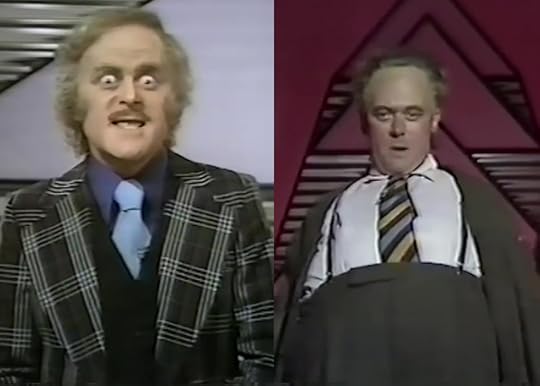
Even Brucie’s disco dance contest gets a kicking, with Yarwood jigging around in a fat suit as jumbo-nonce Cyril Smith, then as Patrick Moore, copying my pinpoint boyhood impression by closing one of his eyes. Moore’s joke is a truly shocking “better be careful, or I could end up on my Aurora or my Bore-e-anus!” That’s not a thing. How long do you think the writers tried to make Uranus fit there, but couldn’t make it work? Office full of cigarette smoke and screwed up paper — “But it’s not your anus, it’s his… fuck!” It’s a powerful example of the law to which all comedy impressionism is beholden, where even the most accurate voice can’t elevate shoddy material.
The final section nicely sidesteps that rule, by having the voices and jokes be equally shite. I mean, he outright tells us he’s about to do Tom O’Connor, perhaps aware that he could start killing audience members one by one until they identified who he was meant to be, and there’d be nobody left standing. It’s a quickfire flit through characters; O’Connor tells a gag about Jews and Scots being tight; Dave Allen brushes his trousers; Frank Spencer’s “got a boil in my botty!” Max Bygraves is there; the same Max everyone does, shaking your hands like the dryer’s bust in the bogs. Frankie Howerd shows up, along with Eric Morecambe, Prince Charles, and Eamonn Andrews, who’s presenting the Big Red Book to Sammy Davis Jr. Thank God there’s no time to get the boot polish out, and he makes do with a pair of prop glasses, behind which he squints, hunched and pushing his chin out, before pretending his eye’s fallen out, “and it’s the good one!”
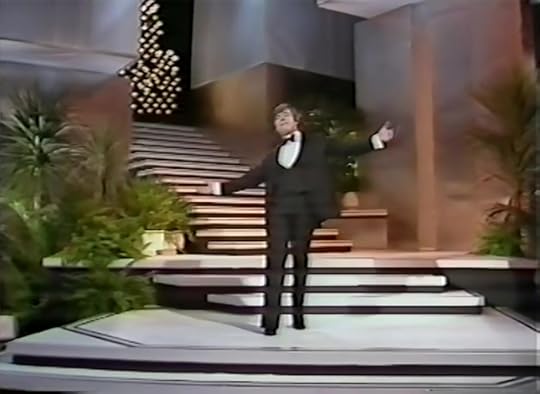
With a final “and this is me,” he sings us out with Swinging on a Star, pointedly belting a very self-satisfied “you have been swinging with the stars!” That’s got a very different connotation these days, mate. Maybe the Krankies pinched that too. Though this originally went out on Christmas Day, it’s find myself hanging on the historical weight of the repeat, and the VHS tape which preserved it. Not long after the end credits rolled, Thatcher would ascend to her dark throne, while some miles away, a small baby was born — much like that other famous baby born on the first-run date of December 25th. I’m not saying that post-election child was a saviour, but I am implying it. Though I love the cultural archaeology in digging out these forgotten works of TV-stink for a new generation, there’s a horrible circular feel to this one, like time travel stories about men who accidentally become their own grandfather. “…and this is me!” [pull back to reveal I’m the midwife at my own birth, except I’m dressed as Sammy Davis Jr.]
…
This piece first appeared on my Patreon, where subscribers could read it a month before it landed here. If you’d like to support me for as little as $1 a month, then click here to help provide the world with regular deep dives about weird-bad pop culture, early access to my podcast, and all kinds of other stuff.
There’s a ton of content, including exclusives that’ll never appear here on the free blog, such as 1970’s British variety-set horror novella, Jangle, and my latest novel, Men of the Loch. Please give my existing books a look too, or if you’re so inclined, sling me a Ko-fi or some PayPal cash.
December 22, 2020
Noel’s Christmas Presents
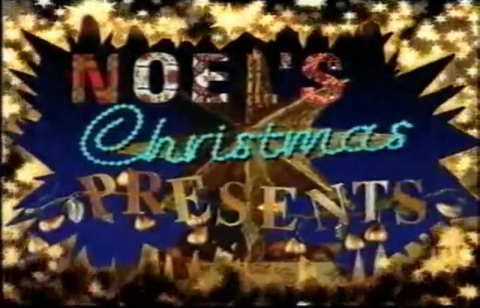
[More Noel: Noel’s HQ — First & Last: Noel’s House Party — The Live, Live Christmas Breakfast Show — When Noel Tried to Crack America — House Party Hell Playlist]
With my distressing fixation on Edmonds, Noel’s Christmas Presents is one of those suggestions that comes up a lot, and I almost went there last year, only to decide against it at the last moment. How could I possibly write about the cultural byword for kind-hearted event television which left its audience weeping, and to this day, remains embedded in our national psyche, both as entertainment and as the most powerful Christmas spirit Broken Britain had to offer? Noel’s only desire — like Scrooge on Christmas morning — was to bring a little joy to the needy and unfortunate, asking for nothing in return, and I’m supposed to blunder in with my observations; my cynicism and jokes about spunk; over the real tears of real people?
But then, in returning to the idea, I was reminded how every second of these shows was filtered through the singular creative vision of one of the oddest men who’s ever lived. With decades now passed since they first aired, time has splattered these hours with comically unwieldy tech and unimpressive gifts; with horrid fashions and naff celebrities, and the unique presenting style of Noel himself, all of which slightly dulls the edges of the endless parade of horrific sob stories, making them easier to view objectively.
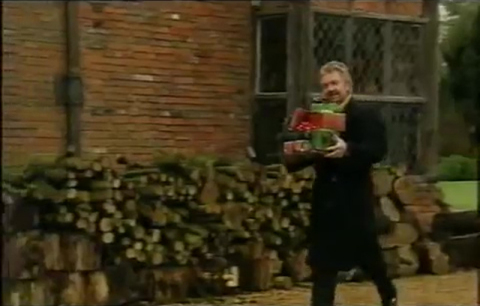
With the benefit of hindsight, to 2020 eyes, Noel’s Christmas Presents plays like a cross between House Party‘s Gotchas and those viral videos where someone’s filmed themselves buying a homeless man a meal, selecting a soppy soundtrack that’s just right before posting it on all their socials. While the conceit is philanthropic, essentially it’s Noel taking his pathological need to prank and surprise; to put people on the back foot; but using it for good instead of evil. The whole thing turns on that imbalance of power that he so loves; Noel Edmonds off the telly and Bob the photocopier repairman from Nottingham — only one of them’s got a microphone, and only one knows how this is all going to go.
Christmas Presents slotted firmly in a genre which was incredibly popular in its time, as also seen in Cilla Black’s Surprise Surprise, of making the Great British Public cry by springing a lovely video message on them, from a cousin they’ve not seen for 25 years after they emigrated to Australia, only to reveal that’s not the real surprise, before bringing the cousin out in person. The head of its class, Noel’s take became a festive tradition, as much a part of the British Christmas as turkey blow-offs and your grandma tutting when Lenny Henry came on a trailer for the Boxing Day line-up.
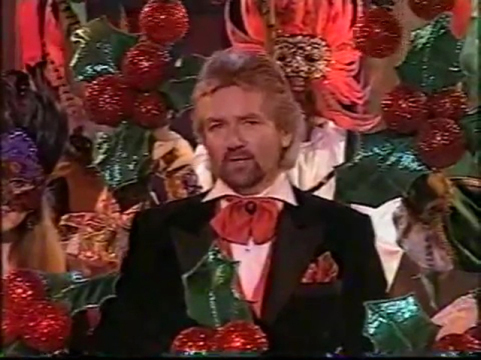
The series of annual specials ran for a decade from 1989 — 1999, ending when Noel left the BBC after the cancellation of Noel’s House Party. Sky One would bring it back in 2007 for a six year run, but randomly shoving them out in the week leading up to the big day — missing the whole point of sitting down to watch right after the Queen was done talking — and perhaps with audiences more savvy to the cynical manipulations of television, the magic was gone. 2012’s final effort wasn’t even hosted by Noel, with Corrie‘s Sally Lindsay taking over for a rebranded All Star Christmas Presents.
Unthinkable, isn’t it? His thundering vehicle with someone else at the wheel. There’s a line at the end of Bill Murray’s Scrooged, after his character Frank Cross makes the babyface turn, and James Cross remarks “my brother, the King of Christmas!” In the nineties, there was only one man on that throne, and it’s the role he was born for, in perhaps the ultimate example of nominative determinism — “The First Noel, the Angels did say…” For nineties kids, he was basically our Santa. He even looks like an anime Father Christmas. We’ll be diving in with King Noel at the height of his powers, for an episode which aired in 1996, of course, on Christmas Day.
Festivities take place in the grounds of a medieval castle. A huge, war-like banner hangs from a tower, reading NOEL’S CHRISTMAS PRESENTS, as he emerges for the live crowd, flanked by dancers and dressed like a Victorian mayor. It’s so cold, you can see his breath as he takes his place in the audience beside a burning brazier, and tells us it’s ten years since the explosion at Chernobyl; “the result was an atomic cloud, spread across the countryside.” Merry Christmas! As we’ve learned on these pages, Alan Partridge comparisons are an unavoidable side-effect when delving into the hell of light entertainment, and Noel invites a powerful one right out of the gate.
Evidently, the people of Lancashire formed a tight bond with their radioactive brethren in Belarus, becoming pen-pals, and very occasionally, flying them over to the UK for in-person visits. This first present really sets the tone, and they each have the precise energy of Noel pulling someone out of the audience on a Saturday night, to answer embarrassing questions before getting covered in slime. As everyone’s waiting at the airport with gifts to be put on the plane for their friends, who should walk in but Noel bloody Edmonds; snazzy jumper, mic in hand — “they weren’t expecting to see me!” Everything’s a prank with him, and he tells them they’re all off to Belarus too, along with ten tons of aid he’s got secretly stashed in the aircraft’s hold.
The captain’s intercom fills with wheezing as Noel announces another surprise, with “someone who’s very popular in Belarus, and extremely committed to children’s charities.” Come on, any guesses? Norman Wisdom’s big in Albania, isn’t he? Or maybe Bono? Christopher Biggins? No, it’s — “…please welcome, Chris de Burgh!” Fucking hell, any spare parachutes? Never mind, I’ll go bareback. Truthfully, the people of 1996 are thrilled, one woman sinking into her seat with an orgasmic “oh my God!” and as friends from Minsk and Lancashire embrace, they’re serenaded by de Burgh’s rendition of Silent Night. Incidentally, do you think the words “the Chris de Burgh please, my good barber!” have ever been spoken?
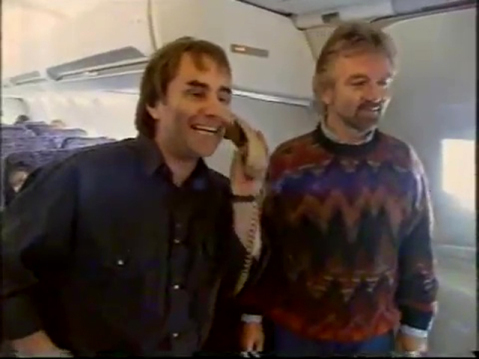
The presents are broken up by interludes at the castle, with dancers dressed as medieval jesters or harlequins, prancing all hey-nonny-nonny with Venetian ball masks while lip-synching to a warbled backing track of The Holly and The Ivy. It feels like the entertainment laid on for Joffrey Baratheon to sneer at on his wedding day, before ordering all their arses to be cut off and fed to a wolf. This strange mix of eras, with Victorian Noel in the Middle Ages, confirms his role as transdimensional trickster, ungoverned by the rules of time, and leaping through centuries to dispense presents/pranks.
His next double-cross centres on a recently widowed old lady, who’s been putting money on the horses to try and win the airfare to see her cousin in Canada. As if appearing in a cloud of sulphur, Noel’s suddenly behind her at the bookies, pulling a mic out of his jacket, with a look on his face that permeates the show, a look that says “yes, it’s me, off the telly, with you, who isn’t off the telly… let that sink in.” Noel’s other trademark bombshell is casually dropping the mark’s name – “Hello, Maureen…” “How do you know my name?!” But she’s enraptured by our BBC Puck; “ooh, he’s lovely,” and just like her grandson, “…exactly like him. I wish I’d have brought a picture for you!”
Celebrity helper for this one is John McCririck, notably dialled down from the post-Big Brother years, and not once mentioning great big women’s tits, or eating a single bogey. Noel breaks the news he’s jetting her off to see cousin Dexter, whom she hasn’t seen for 72 years, as Enya’s Orinoco Flow kicks in on the soundtrack — “sail away, sail away, sail away…” Where Christmas Presents truly excels as saccharine emotional sob-fodder is in its musical choices, and I’ll be fastidiously keeping track of all the brilliantly on-point needle drops.

The elderly cousins reconnect, but Noel’s the fucking Columbo of gift-giving, always with “just one more thing,” dropping surprise on top of surprise. Though she can’t stop gambling, the lady’s never been to a race, so Noel takes her, but I guess it’s off-season, as they just have a couple of horses ride by in an empty, rainy stadium. Amid all the globetrotting family reunions, there’s still room for smaller, if no-less emotionally devastating stories. One has a children’s dance teacher perform onstage at the West End with Anthony Newley, while another centres on a little girl who survived the car crash which killed her brother, with the other driver unidentified and still at large. Noel surprises her with a Father Christmas, revealed to be — thank God — her grandpa, flown over from Australia.
I’m sure it’s just a coincidence that most of the presents involve Noel gifting someone a holiday and tagging along, as the amount of countries he visits in a single hour of television put Michael Palin to shame. For Ted and Rita, just meeting the man is surprise enough — “Well I’m blowed. A Gotcha, is it? Strewth, Noel Edmonds, of all people!” The BBC appear to miss an unbleeped “shit” when the old boy learns they’re flying 6,000 miles to see his brother in South Africa. In a rather cruel jape, Noel spears this emotional moment with a casual “all we need are your passports,” to a sad reply of “we haven’t got one…” No worries, he takes a pair out of his pocket. Is that legal?! The pre-911 world was a different place; “Hello, British embassy? It’s me, Mr. Blobby’s dad, Noel Edmonds. I’d like to register passports in the names of two strangers without them knowing. No, no, I’m not a terrorist…”
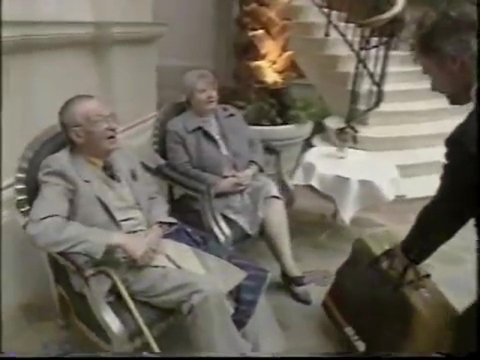
They can’t just meet though, and needlessly, long-lost brother Bob reports to a yacht club to record a video message for Ted, who hides as Noel plays producer, repeatedly butting in like it’s Trigger Happy TV, while elderly Ted very slowly walks up behind. Even after they’ve reunited, the pranking will not stop, having the lads pose for a portrait while they sneak in another dozen family members Bob’s never met (moving soundtrack: instrumental cover of He Ain’t Heavy, He’s My Brother).
My favourite present goes down at the annual reunion for the ladies of the Royal Artillery who served in WW2. Noel interrupts a mayor to introduce a brass band, brought in on the back of a truck with NOEL’S CHRISTMAS PRESENTS written on it, playing Colonel Bogey, or as most people know it, Hitler’s Only Got One Ball. But there’s an enormous gift-wrapped box on the back too, and in a moment which genuinely floors me, Gloria Hunniford punches her way out of it. Not even a singer, Hunniford serenades the old soldiers with We’ll Meet Again, cut together with b/w footage of British women during the war — “everybody wave your flags!” Nigel Farage’s VHS of this must be fucking unwatchable by now.
The patsy is Vera, who wrote a book about the exploits of the war ladies, but couldn’t find a publisher. Pre-Amazon, if you wanted to get your work out there, the only route was through Noel surprising you with a contract with Harper Collins, as he does here. Out in time for Christmas, with the foreword by a Mister N. Edmonds, we see shots of it rolling off the printing presses (needle drop: Paperback Writer), and it’s still available on Amazon today (used) under its title Sisters in Arms.
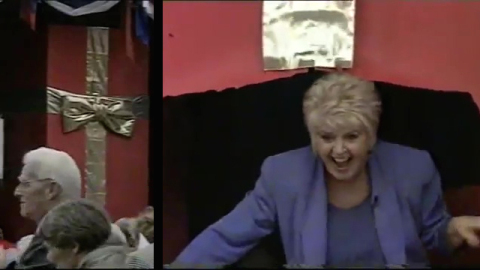
The year’s finale is the most outrageous stunt of all. Alerted by a letter from her mother, Noel targets a girl with a rare genetic condition, who’s written a poem about world peace. He meets the family on an open-topped bus touring London, but can’t just say hi, instead masquerading as a tour guide named Trevor who speaks in a Mr. Bean voice. After dropping the act, he has the bus pull up in Downing Street, and takes them into Number 10, right into John Major’s office. Luckily it’s not a single parent family, or Major would’ve kicked the girl straight out of the window. Even though he’s still a Fucking Tory, in today’s climate, it’s strange to see a leader behaving all professional and statesmanlike, rather than accidentally-on-purpose getting his foot caught in the fireplace to appear endearingly bumbling, or parroting whatever PR slogan’s been decided on for the day like a broken robot. Major, who’s name-checked in the poem, has her read it to him — in a shaky little whisper that seems on the verge of tears, in a terrifically awkward moment — before Noel takes the family off to Disneyworld, in a classic double-surprise.
Mickey gives her an enormous key to the Magic Kingdom (with the top shaped like his own head, rendering it very, very penisy), while I wonder who’d win in a fight out of Pluto and Blobby. But it’s Noelception, with surprises all the way down, and he interrupts their holiday with a second trip; to Washington DC, where they’ll be meeting President Clinton. In one of the more surreal moments ever to be televised, Hillary Clinton asks the girl who she’s brought with her to the White House, to the reply “my brother, my mum and dad… and Noel Edmonds.” Noel in the Oval Office, a dream come true! Try to imagine that happening today. Any scenario where Trump’s given a poem by a special needs child from the UK ends with Whitehall launching the nukes. Noel would probably end up Secretary of Defence, mowing down protesters with a gunge cannon.
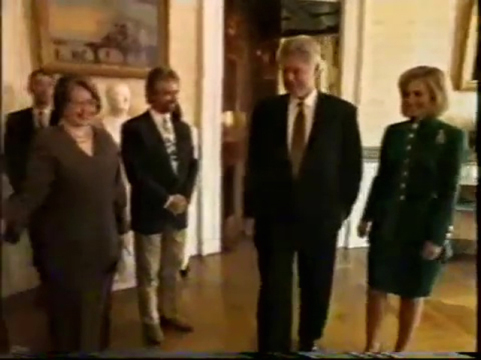
Despite the promises of Major and Clinton after reading the poem, world peace was not achieved, but in every other respect — wringing audience tear-ducts dry while Noel looked tremendously pleased with himself — Noel’s Christmas Presents 1996 was a resounding success. So then, onto the 1999 edition. The final year has a markedly different feel, with Noel and the BBC on the outs, after House Party was acrimoniously taken off air the previous March. Presumably contractually obligated, this would be his final appearance for the Beeb, until a one-off presenting gig seven years later, followed by a public boycott of the licence fee, and threatening to buy the BBC, like when Vince McMahon bought WCW solely to publicly destroy it. Running out his contract, accordingly there’s a more lo-fi feel, significantly cutting down on the air-miles, and even the run-time, down to 50 minutes from the usual hour. Pretty harsh, if you recall the words of his own IMDB bio, which he definitely didn’t write himself.

With no audience, we open in media res, with Noel strolling round the corner of a country manor, past a pile of chopped up logs, arms laden with pre-wrapped gifts. Is this meant to be where he lives? Because it’s definitely not Crinkley Bottom Manor. Maybe that place came with the job, like a lighthouse keeper. No House Party, no home! “As you can see,” he says, “I’ve got my Christmas presents. Hope you’ve got the box of tissues!” What’s in those boxes, grumble mags? Apparently, this year’s got a “watery theme” — oh yeah, I’ve seen that category on xhamster.
Establishing the stripped-down feel, the first present’s announced via message written in Comic Sans on the cluttered desktop of a Windows 95 PC. ‘Santa’ shocks the kids by unbearding, with a falsie on top of his real one like Jeremy Beadle pretending to be a traffic warden, before sending them to Universal Studios, where Fred Flintstone gives them a new computer, with a CRT monitor so unwieldy, the plane home probably crashed. To save money, a second giftee’s been flown to Universal too, on the pretext of winning a contest. She’s not seen her dad for over 50 years — though it turns out he was an American GI, her mum was married, and he scarpered. Noel accosts her for a random interview, needling round to the subject of her old man. Even talking about it upsets her, so it seems unnecessarily cruel when he reveals that dad’s been sat at the next table the whole time, leaving her convulsing with sobs.
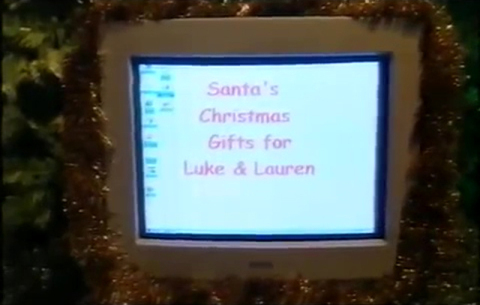
Every segment’s over very quick, with no post-gift interviews, and even the music budget’s been slashed, reducing the backdrop of lighter-raising chart toppers to maudlin stock piano. Instead of dancers, intermissions see Noel prepping for Christmas in his mansion. It’ll be a lonely one this year, traipsing round the east wing by himself like a weekend dad who’s weans have been turned; huge table laden with a banquet that’ll mostly end up in the bin. “This will make you laugh,” he promises, raising a glass of sherry to his lips, but cutting away before he drinks.
To be fair, it does go full Beadle’s About, with Noel clomping into a women’s clothes shop dressed in flippers and full scuba gear, to take a man who’s been crippled in a motorcycle accident to the Seychelles for diving lessons. Noel’s Free Holidays– I mean, Christmas Presents next sees him marching up a driveway in Cheshire, doubling over with laughter as he rings a doorbell only to read a sign “please knock, bell not working!” He’s here to give a boy with cystic fibrosis a trampoline, which crazily, is such a wild dream in 1999, that you have to ask for one off a celebrity. Nowadays, there’s loads of freebies just laying about in the street after a blowy night. So, Noel’s bouncing up and down with the lad, asking if he’s pleased… and? Go on, say it; “we’re taking you to NASA so you can bounce in a rocket!” Nope, no extras. Just a trampoline.
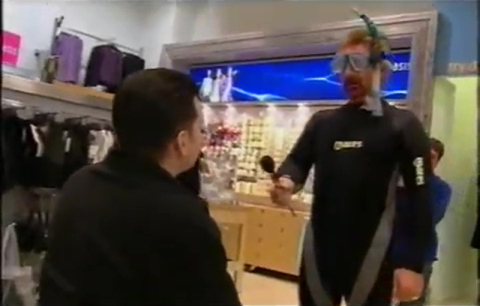
I must touch on the deeply strange way that Noel reacts whenever a member of the public engages with his small talk, particularly when he’s chatting with children. Anyone responding with even minimal banter leaves him utterly aghast, hands on his thighs and looking at the camera with an expression like “my goodness, they’re not even off the telly and they can think; they can speak! How precocious!”
But Noel won’t be happy until every severed familial bond or lost friendship has been reconnected, taking an octogenarian to meet the Icelandic trawler captain who fished him out of the sea when his ship got sunk by a German U-Boat in WW2. His reaction is a genuinely heartwarming “today?! Is my wife coming with me?” Although the reunion is deeply moving, the trawler captain is now 100 years old, with the meet consisting of a very old man shouting directly into the ear of a very, very old man, sat right next to each other, but effectively on satellite delay. There’s a jarring shift when we cut from the misty-eyed chap reciting Ode of Remembrance as he tosses roses into the ocean, to Noel switching on the Christmas lights in Exeter, “in front of an enthusiastic crowd!”
Mic in hand like a buzzing cattleprod, nobody can relax for a second as he plucks more victims from the audience. The wife of an ex-copper who nursed him through a battle with Parkinson’s gets a new handbag, with tickets for a VIP tour of London inside. Not bad, I guess, but they won’t be needing their passports. Would you feel a bit swizzed if you wrote to Noel for, say, a new bike, and he just gave you a bike, and didn’t ‘surprise’ you with a holiday for you and him to Italy, to try it out on the Appian Way while giving backsies to Sophia Loren? Noel ends the segment by telling her to look after her handbag, “as it’s a bit tough in the city,” implying she’ll be violently mugged. Fa-la-la-la-la!
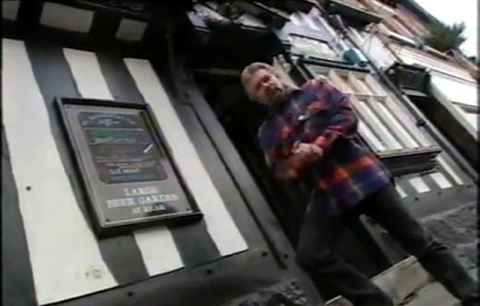
Even speaking as a husk, the reunions are generally quite affecting, but there’s an undercurrent that makes me uncomfortable, with normal people thrust into hyper-emotional situations, often (like the GI father) with complex backstories, reduced to the need for a hug and some tears that can be soundtracked by the key-change in a power ballad, and all under the glare of the camera, while a gleeful puppetmaster prods his mic into the maelstrom. This really crosses a line inside a cramped Northern pub for “a double whammy reunion.” A frustrated Noel pokes away at Ray, who misses the point when asked three times if he’s with the family for Christmas — The whole family? All the relatives? — only to repeatedly says yes. Eventually Noel just tells him, “no, you’re not,” and it’s the old ‘sister in Australia for 30 years’ deal, so he brings her out. Back then, everyone had a family member who emigrated to Australia solely for the purpose of being wheeled on TV as a surprise decades later.
As Ray and sister Carol share the teary hug, Noel tells Carol he knows a lot about her. She went to Australia aged 21, after having to give up a daughter for adoption. Oh, Christ. He won’t, will he? Not here? Everyone holds their breath as he reminds Carol of what she already knows; that she hasn’t seen that child since giving it up — “until now! Come out and meet mum!” Having pulled the pin on a hand grenade of feelings, Noel casually wishes them a very, very Happy Christmas and leaves them to pick up the pieces. After donating musical instruments to a special needs school and giving one boy a ride home in his helicopter, there is but one final present. A bloke called Chris — who we soon find out is dying from cancer — has only one wish, to go halibut fishing with his cousin Danny, who lives in Seattle. Enter Noel, collaring him outside a restaurant before rather sharply admonishing him for taking a step off his mark; “don’t keep walking away!”
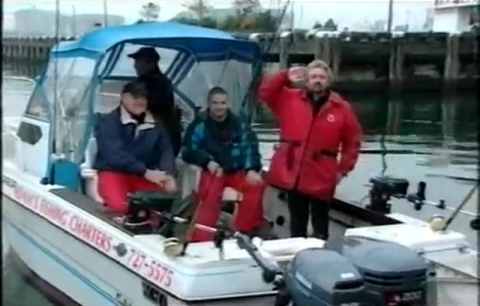
Fittingly for the last at the BBC, it’s your classic Christmas Present, with a double-surprise of two trips; one to meet Danny, and another taking them both to Canada, where halibut’s still in season. They make a gag out of Noel being dragged along too, taking to the water with slo-mo footage of seals and bent fishing rods, and Noel looking cool with his hands in his pockets in a red mac and Gorilla Monsoon tinted lenses. Noel flails from the splashback as Danny lands a 50lber, and the entire music budget kicks in, in the form of Westlife’s Flying Without Wings.
The last ever real Noel’s Christmas Presents closes, as it should, with an absolutely textbook image of Christmas; Noel Edmonds in an armchair, surrounded by festive finery; tree, roaring fire, glass of sherry, Christmas pudding dripping with custard, a posh tray overflowing with Ferrero Rocher. Notably, two stockings hang above the fireplace, the other, we must assume, for Mr. Blobby. Knowing it’s the end of an era, Noel wishes us goodbye “for the final time,” with a sudden jarring close-up that really made me laugh.
We’re played out with Come Oh Ye Faithful by a completely deaf organist (like Daredevil?), living out his dream of performing at Liverpool Cathedral, which Noel informs us is the largest organ in Europe. Subscribers to my OnlyFans may disagree. Accompanied by his granddaughter, they use three combined hands on the keys, like that scene in NCIS where two people stop a hacker by using the same keyboard at once.
Would this show work today? Not in its most-beloved form. Though there are some right thickos about, people are generally more paranoid, and we’re all besieged by scams on a daily basis. Won a ‘contest’ for tickets to the zoo that you didn’t remember entering? Fuck that. Probably gonna get jumped by Dark Web gangsters who’ll suck the Bitcoin straight from our anuses like they’re syphoning petrol. Or worse, Edmonds is gonna leap out at the lizard house and make us all go on holiday together. The analogue world of Christmas Presents was heavily based around family reunions, but now we’ve got Facetime and Zoom, if there’s a relative you’ve not seen or spoken to in thirty years, it’s probably because they’re a prick.

I guess that’s why modern takes on the ‘surprise’ genre rely on celebrities, bringing out someone’s favourite athlete or actor, or if they’re lucky, Gloria Hunniford punching her way out of a box. That’s nice and all, but I don’t know if it carries the simple emotional weight of two siblings meeting for the first time in decades. Through a modern lens, Noel’s Christmas Presents is in turns genuinely moving, cloyingly manipulative, and weird as hell, and at its worst, it’s just more of Noel’s pranking but with a toy at the end, like a bearded Kinder Egg. It works best when packed away with all the other halcyon memories of Christmas past, along with the big film premiere, circling things in the Argos catalogue, and yellowing photos of a much smaller you, sat on the floor in pyjamas, surrounded by He-Man figures and tapes for your ZX Spectrum. Sure, looking back will evoke feelings of comfort, warmth, and better days, but if a game took 14 minutes to load today, you’d probably just sling it in the fire.
…
This piece first appeared on my Patreon, where subscribers could read it a month before it landed here. If you’d like to support me for as little as $1 a month, then click here to help provide the world with regular deep dives about weird-bad pop culture, early access to my podcast, and all kinds of other stuff.
There’s a ton of content, including exclusives that’ll never appear here on the free blog, such as 1970’s British variety-set horror novella, Jangle, and my latest novel, Men of the Loch. Please give my existing books a look too, or if you’re so inclined, sling me a Ko-fi or some PayPal cash.



